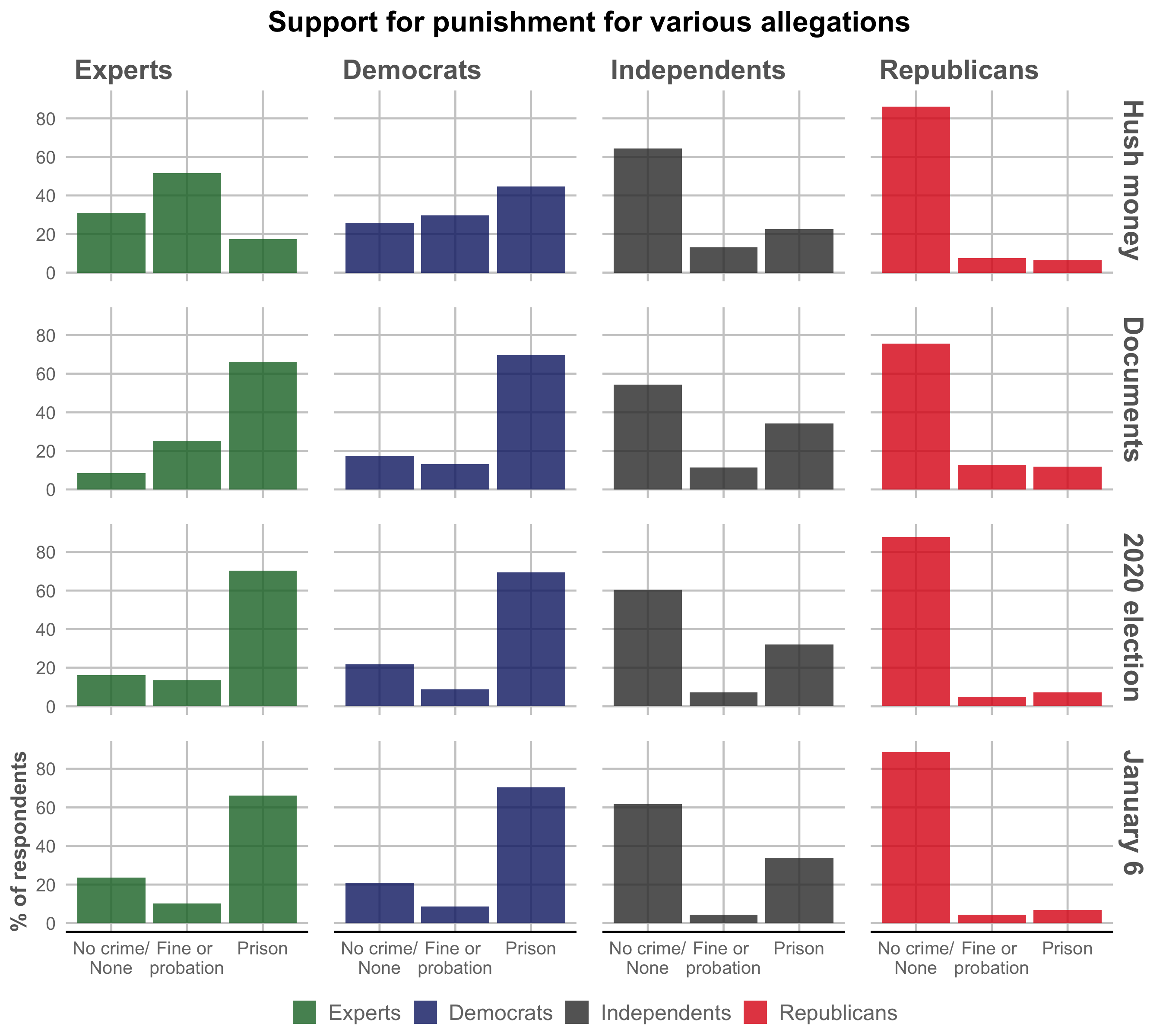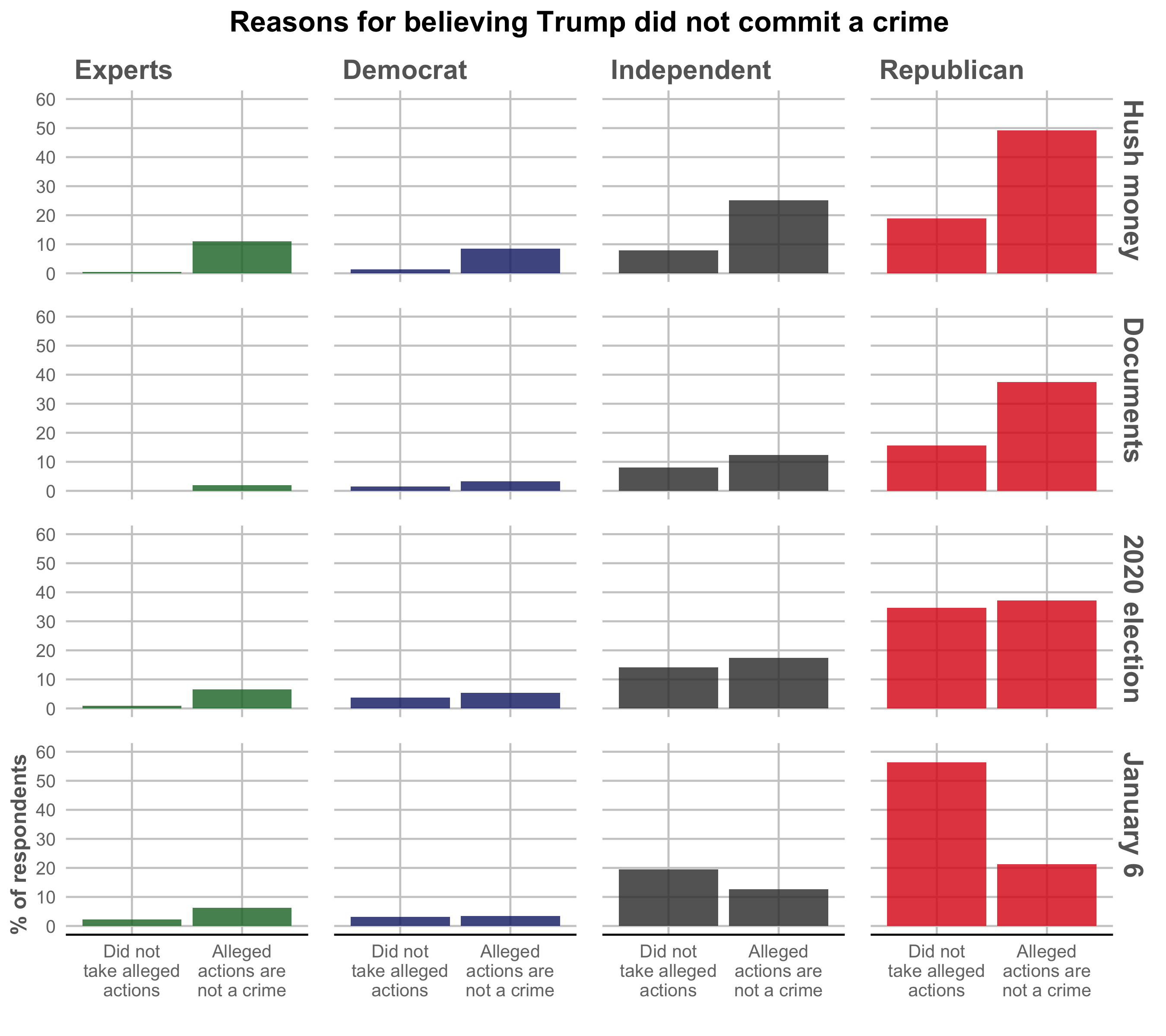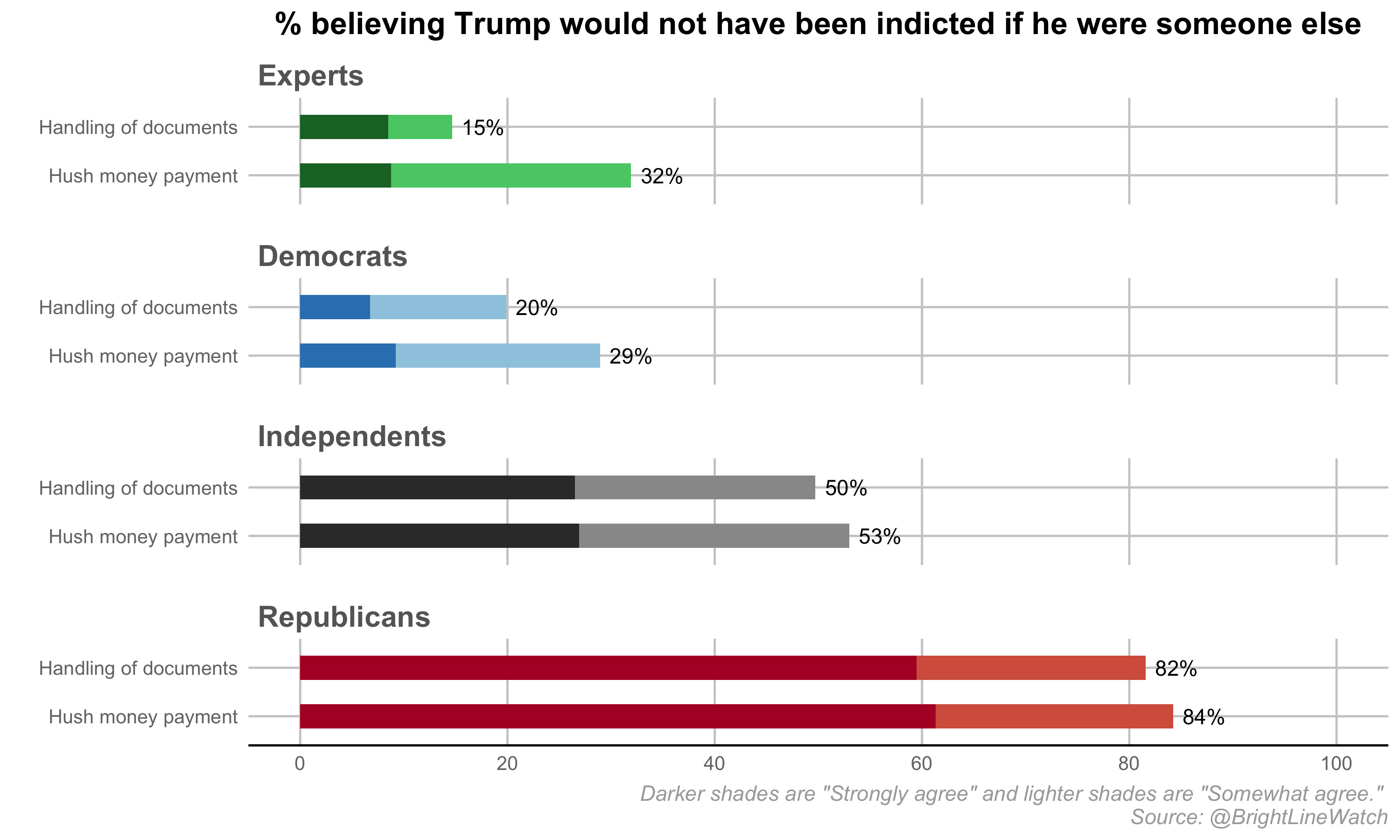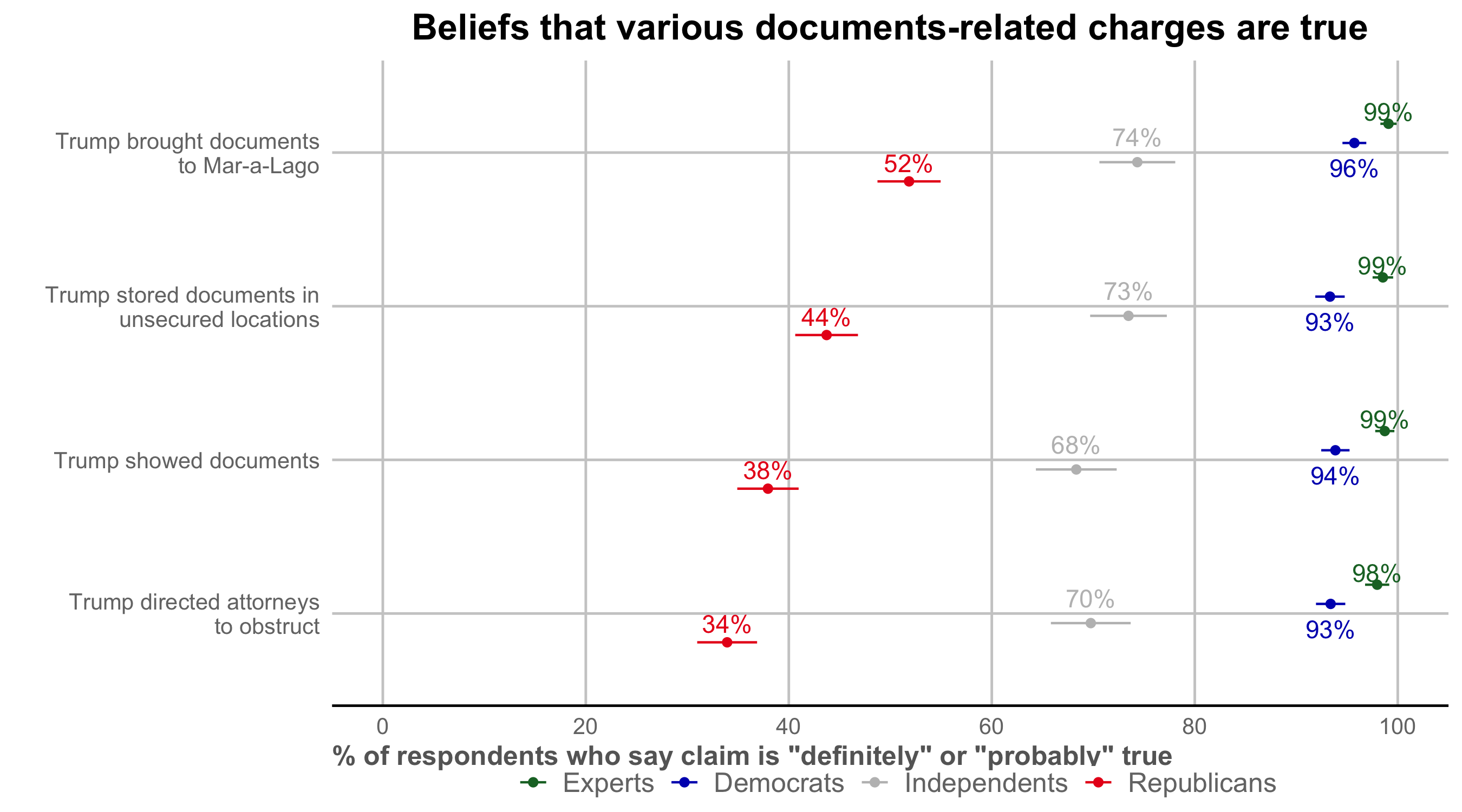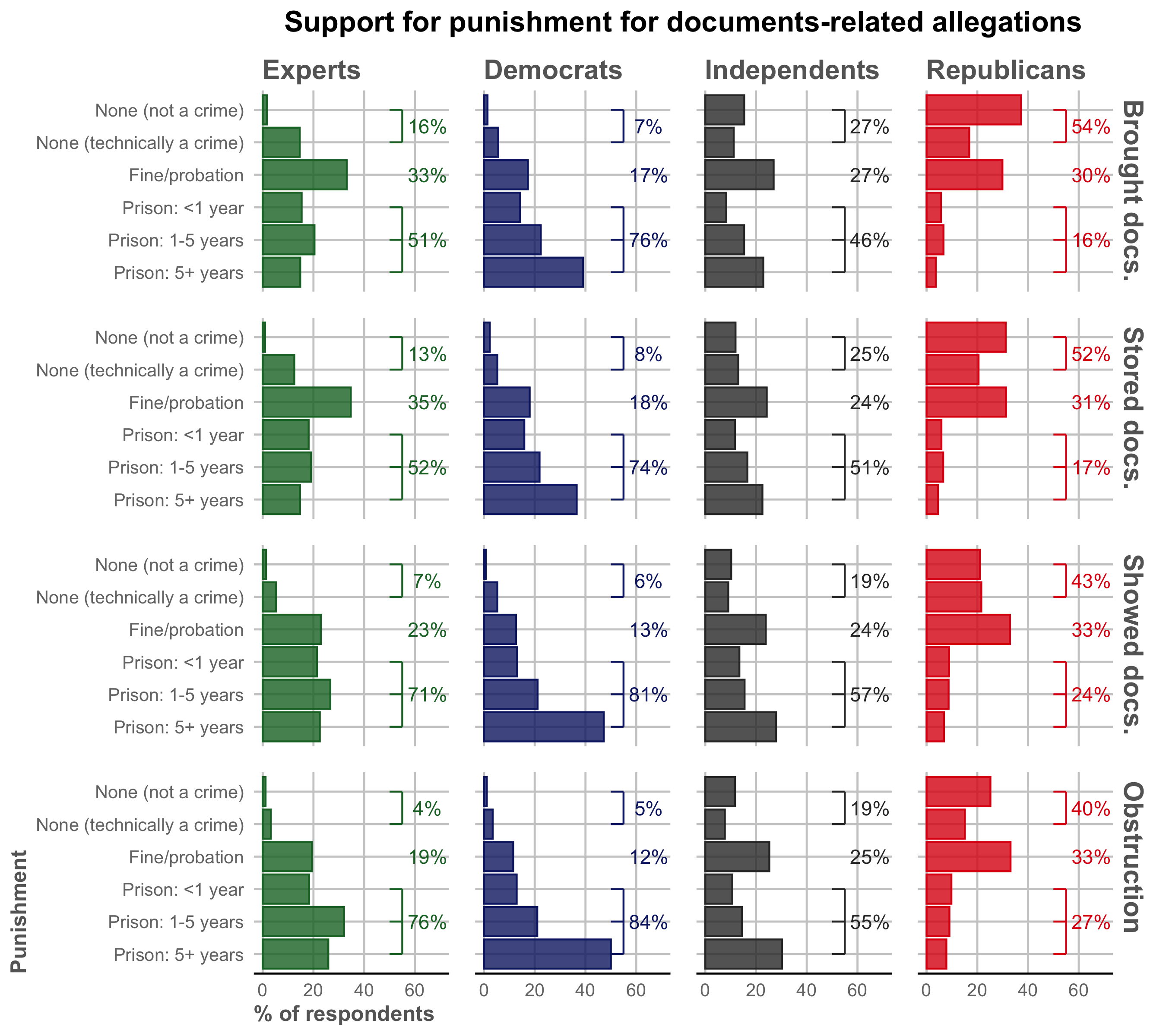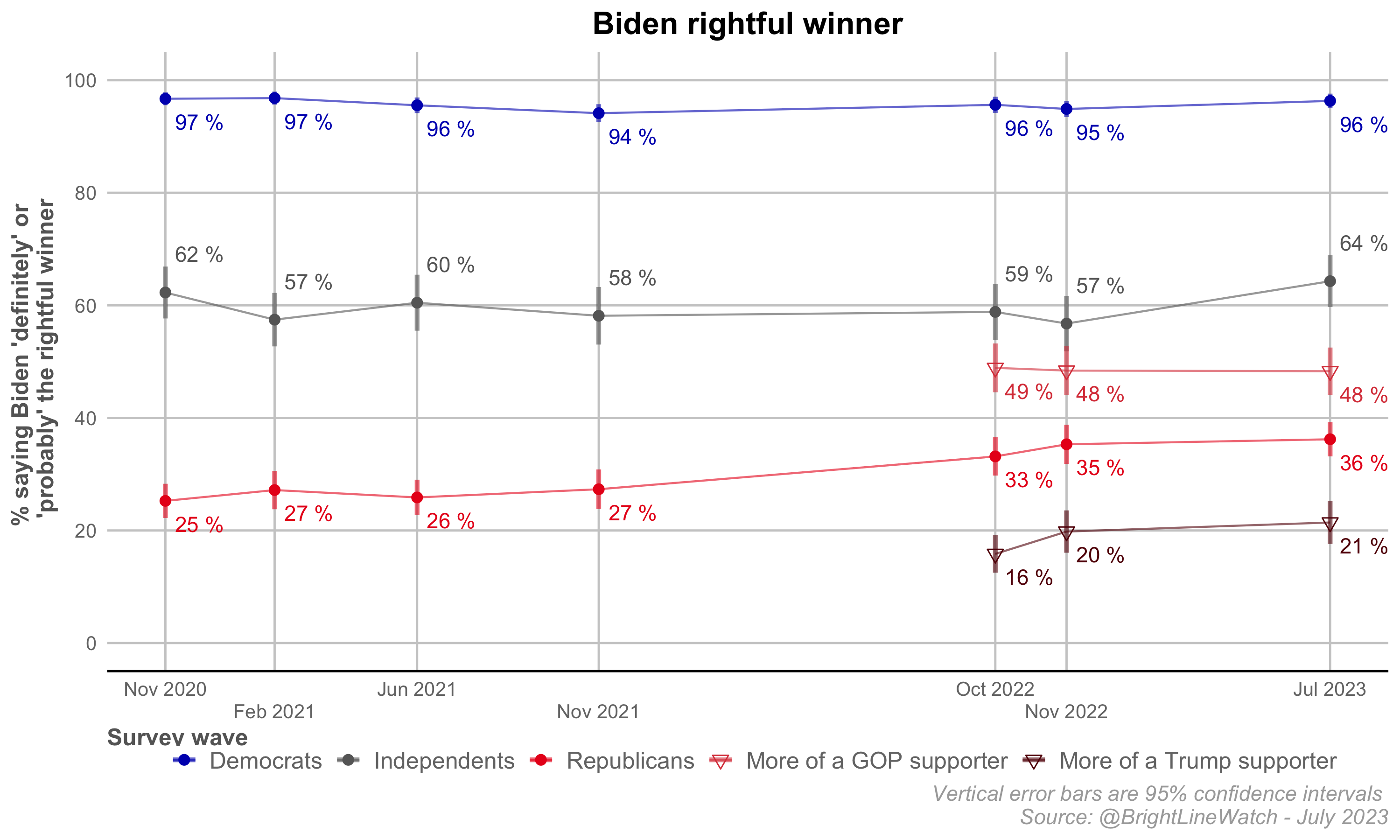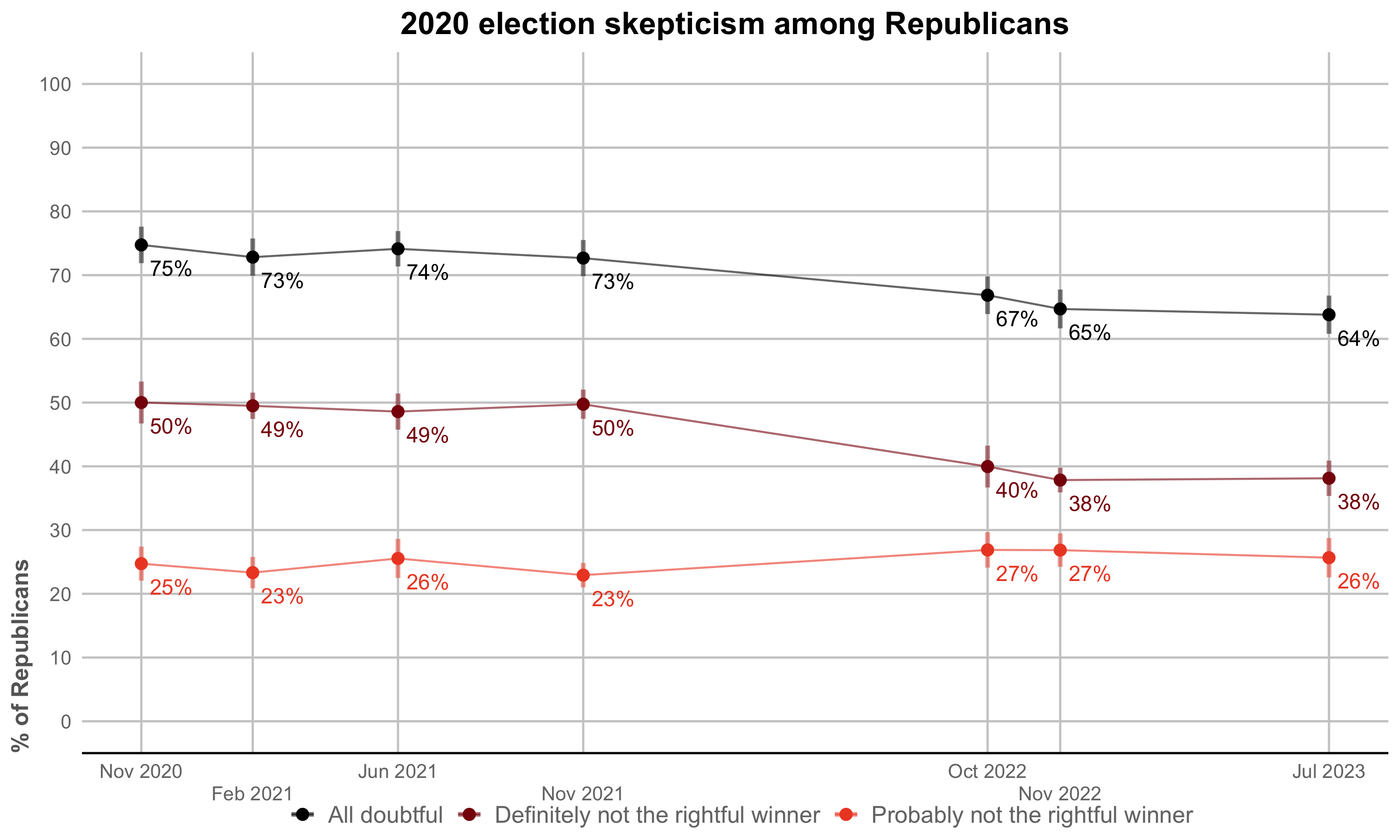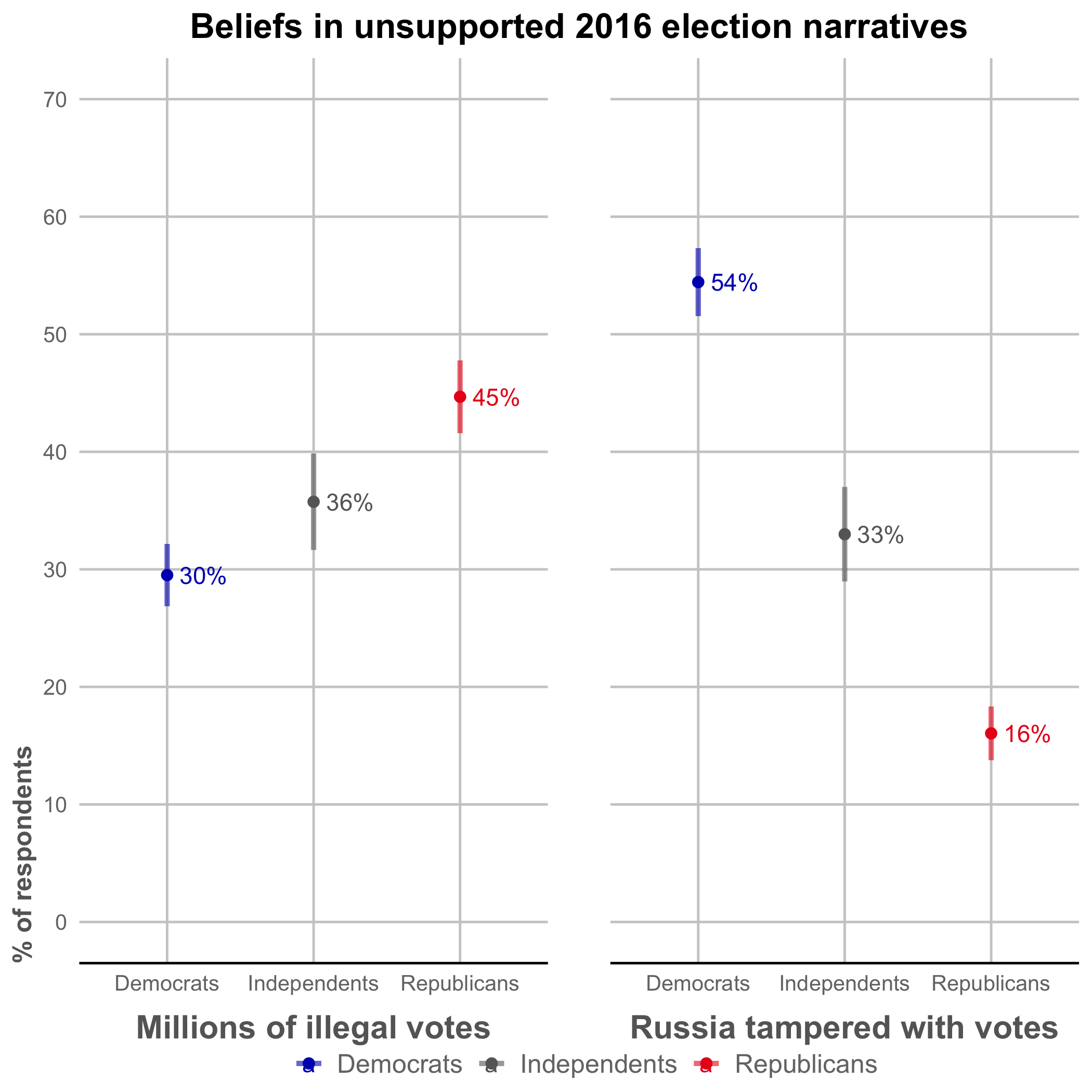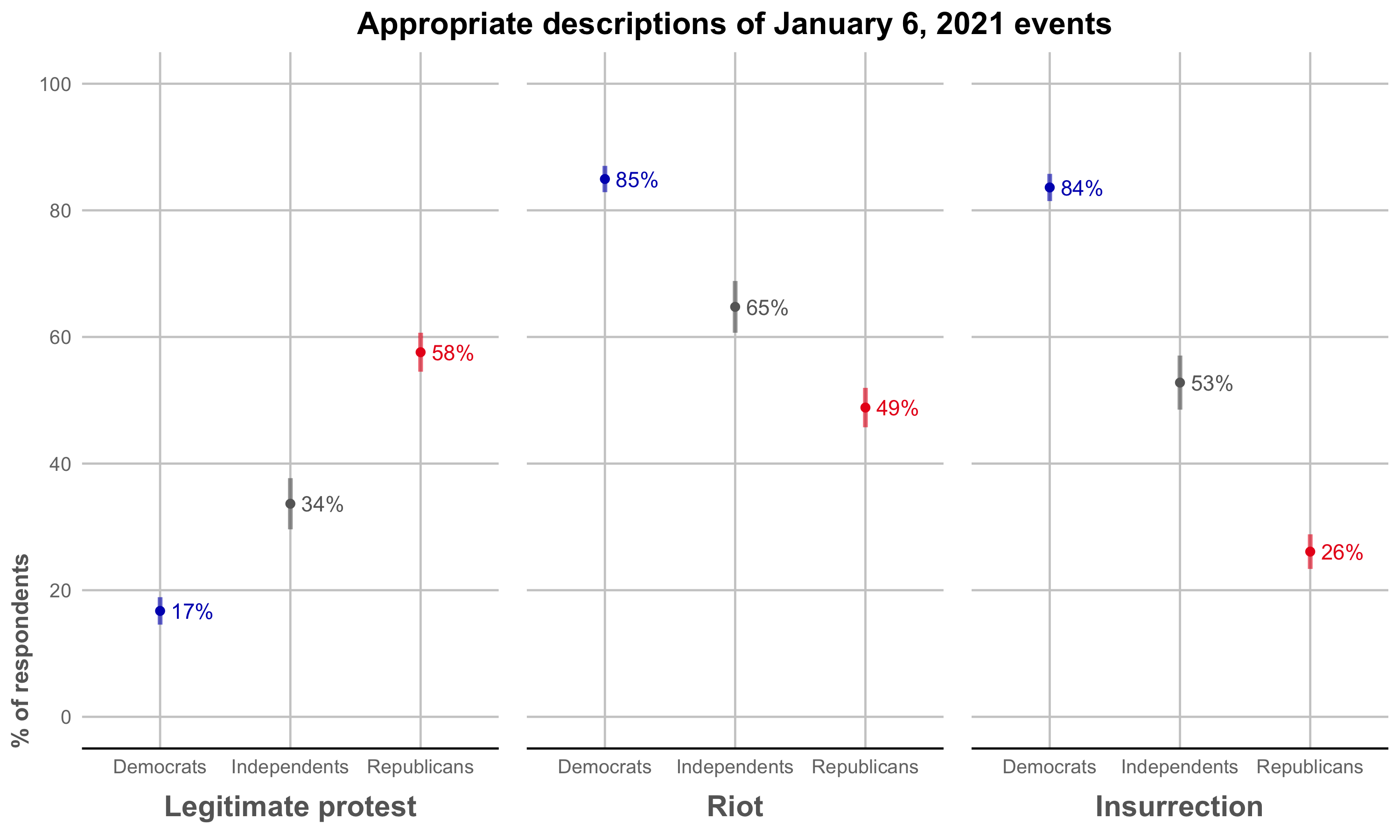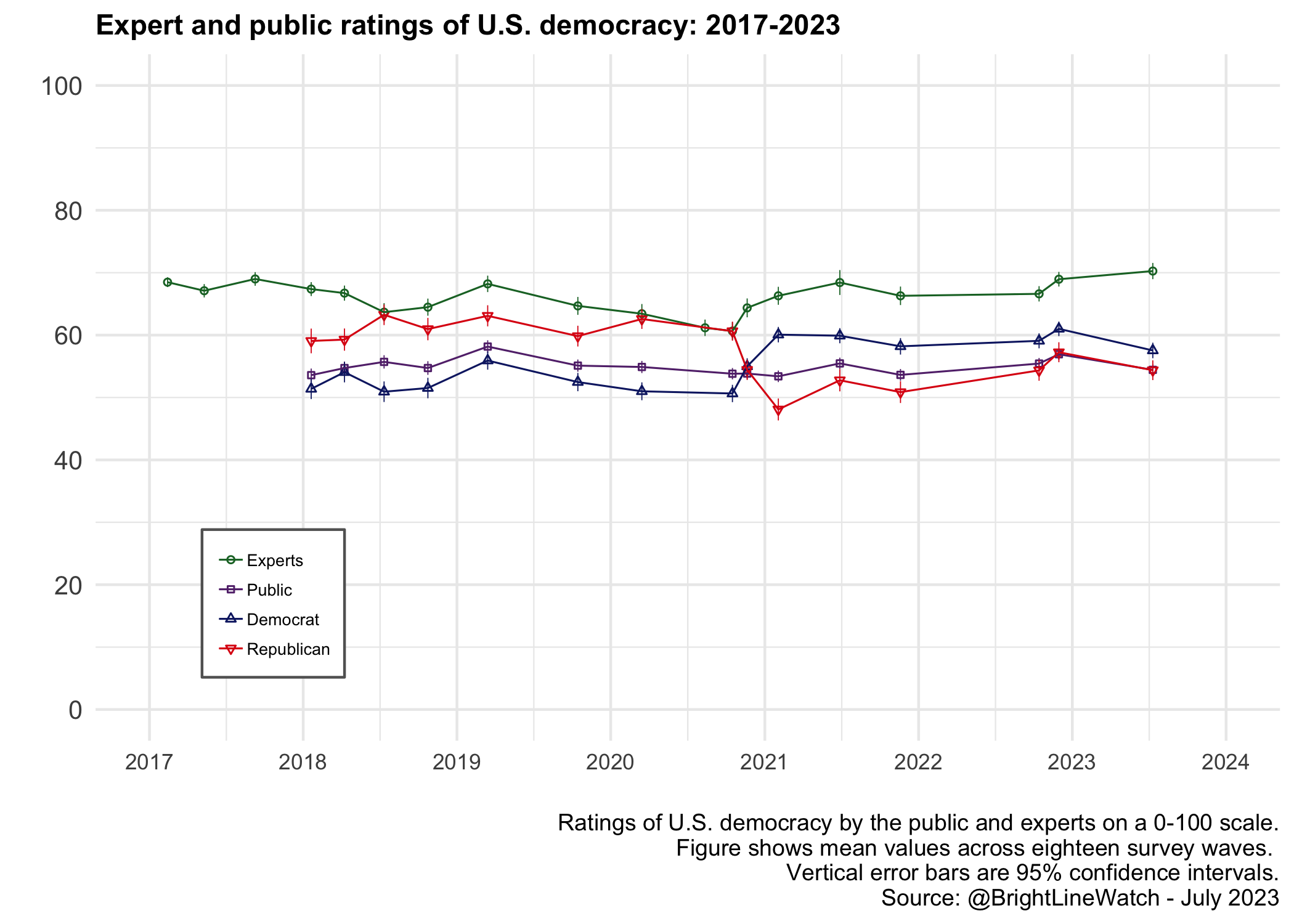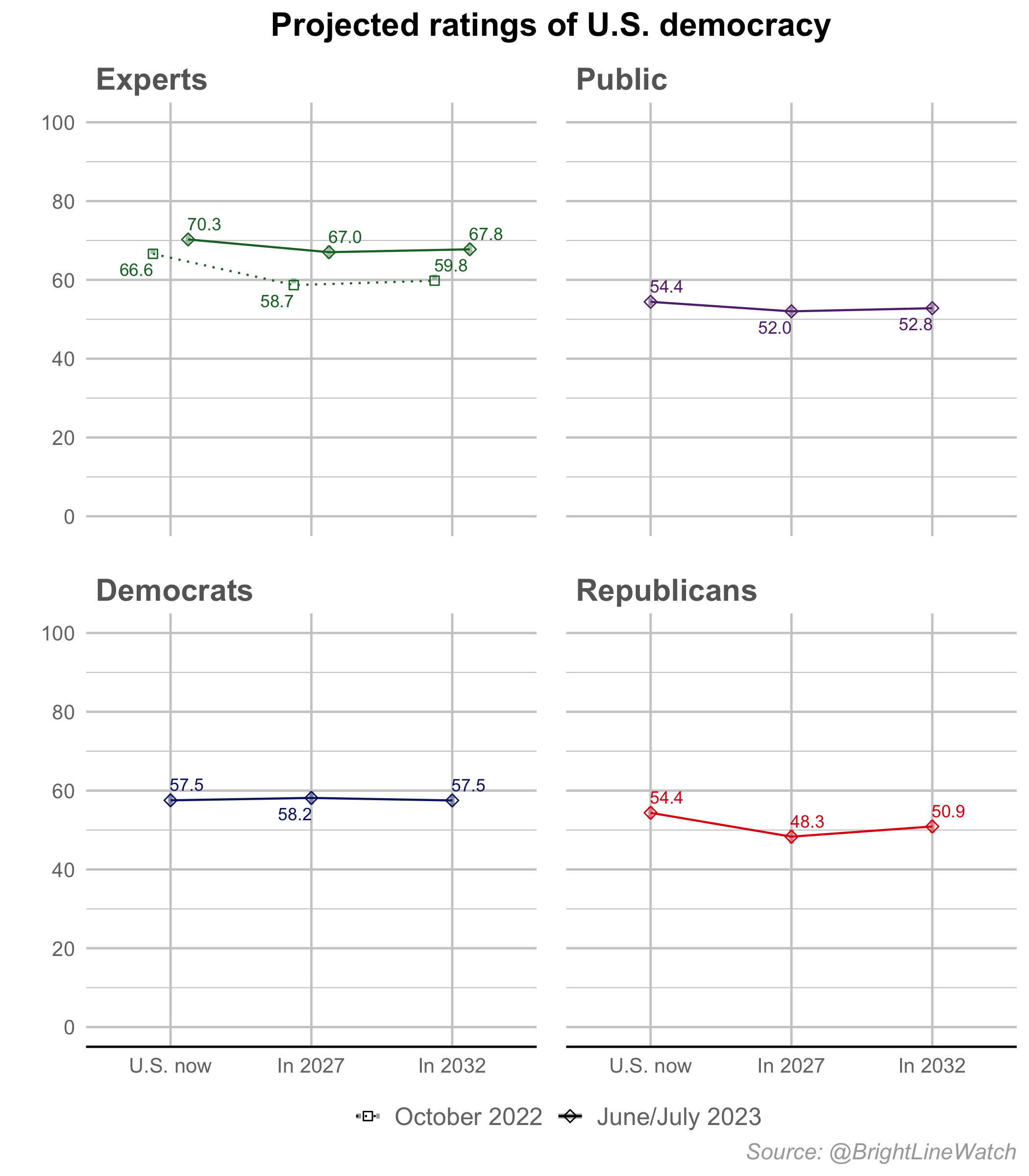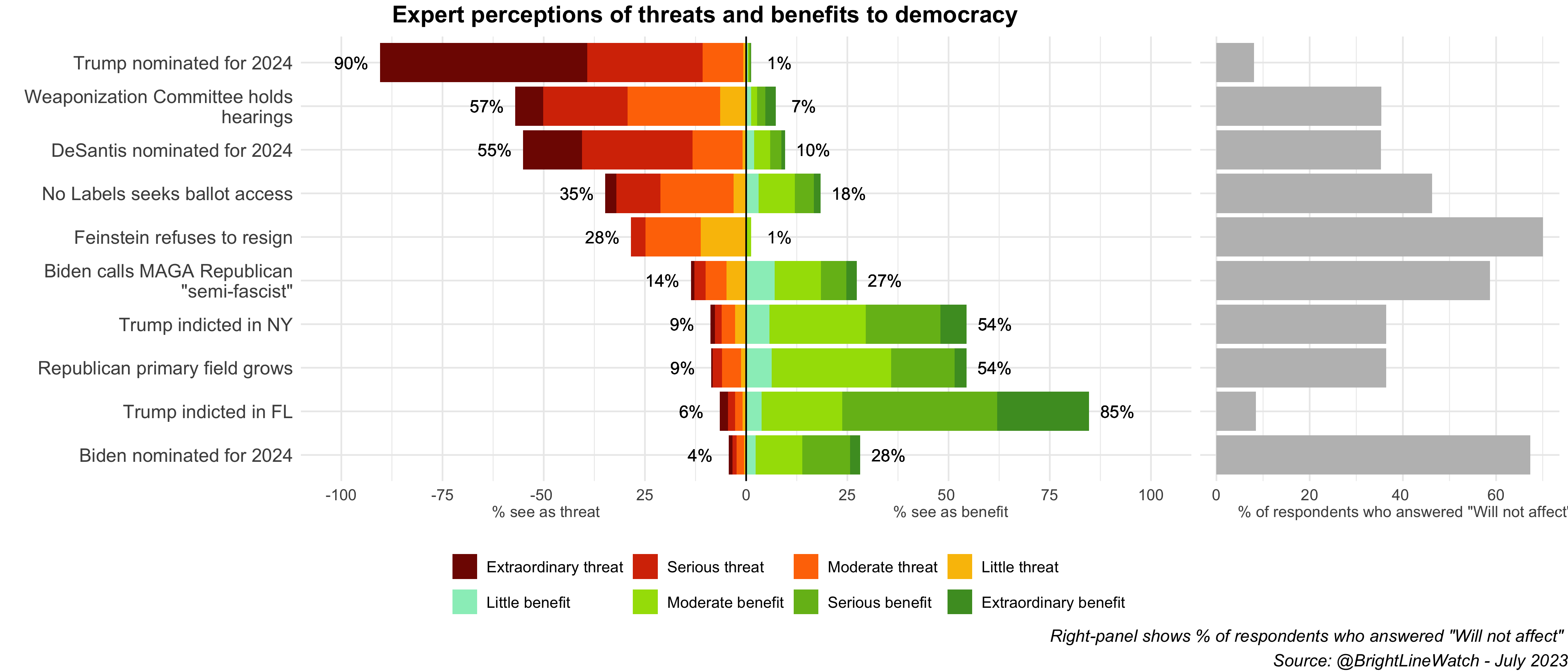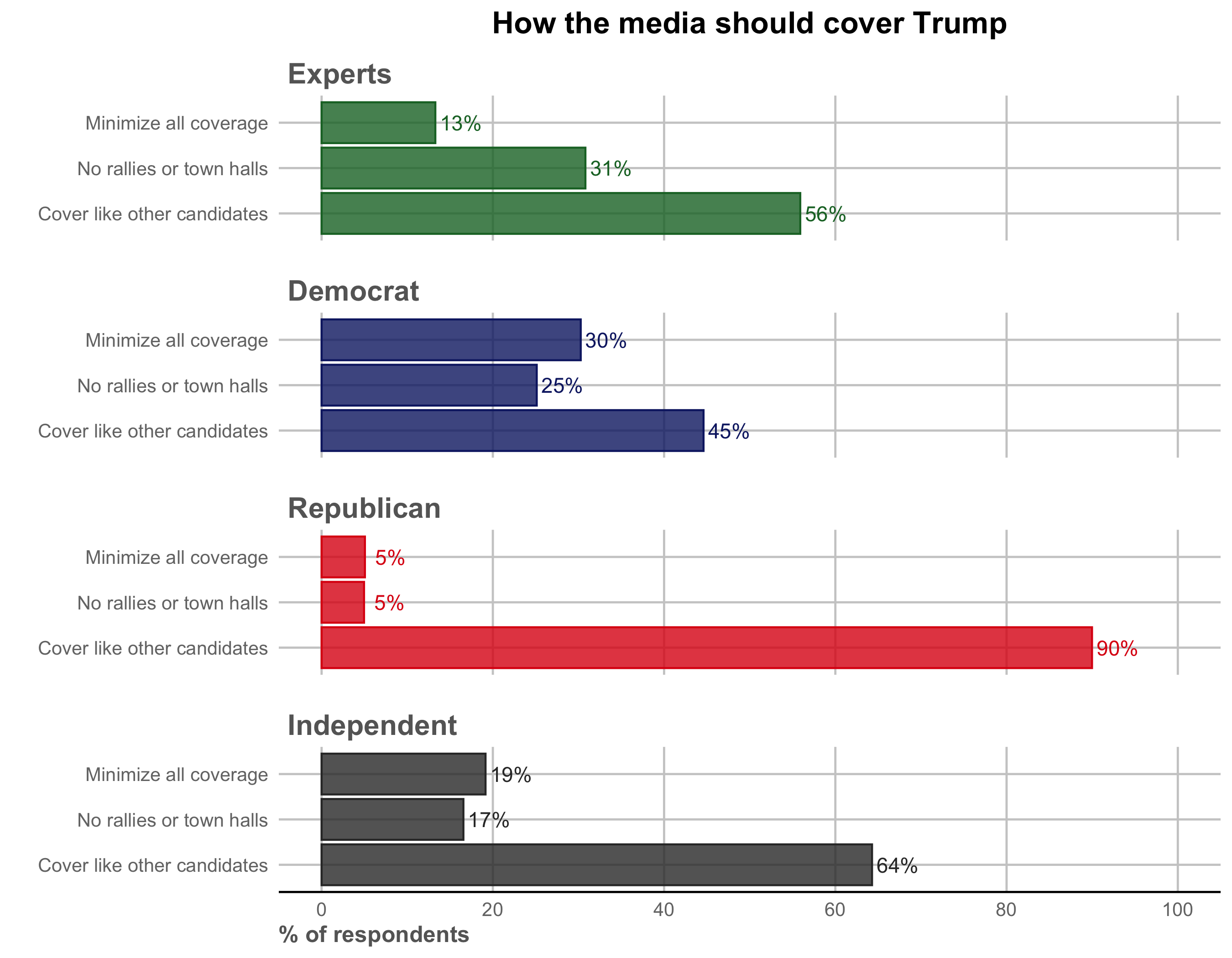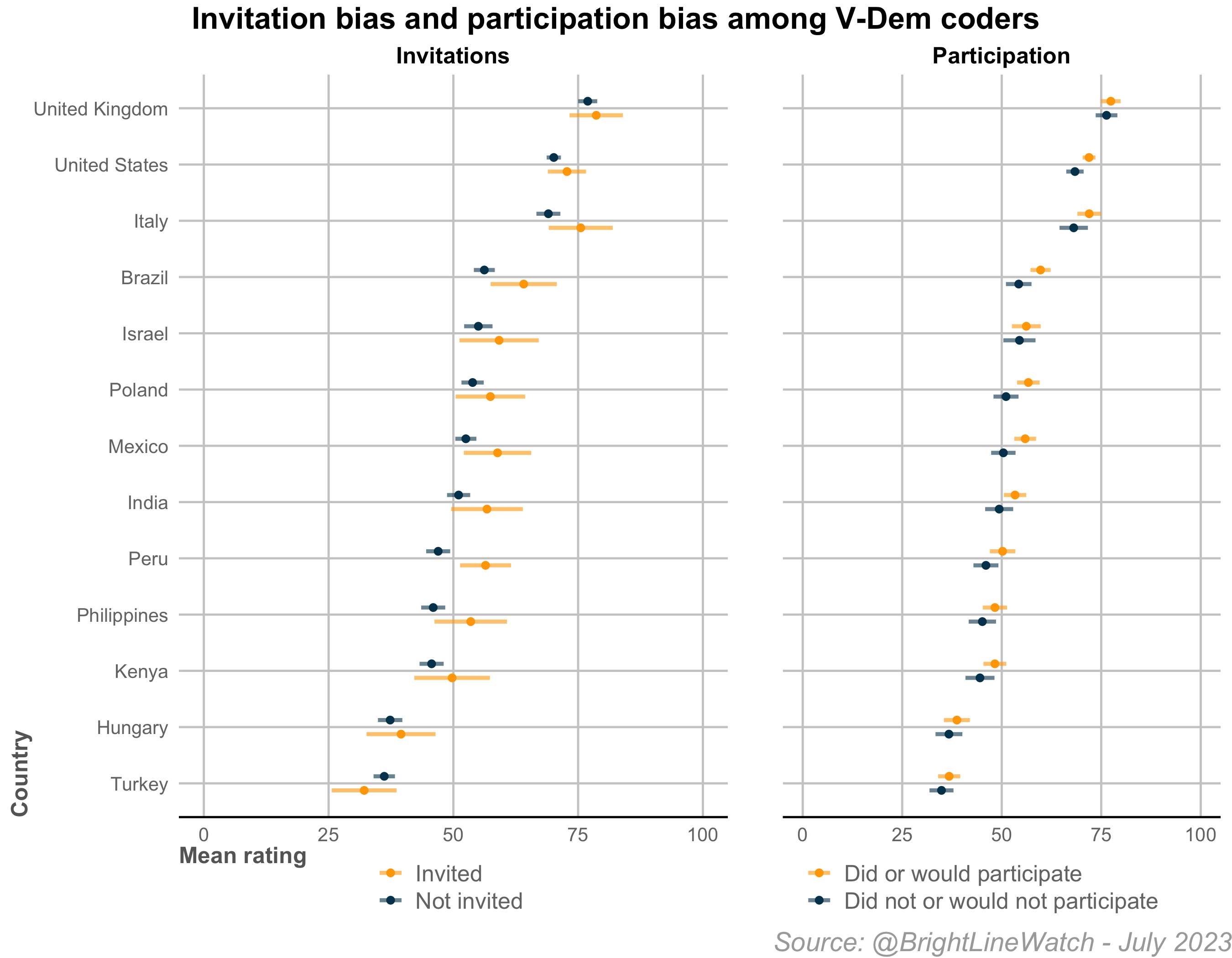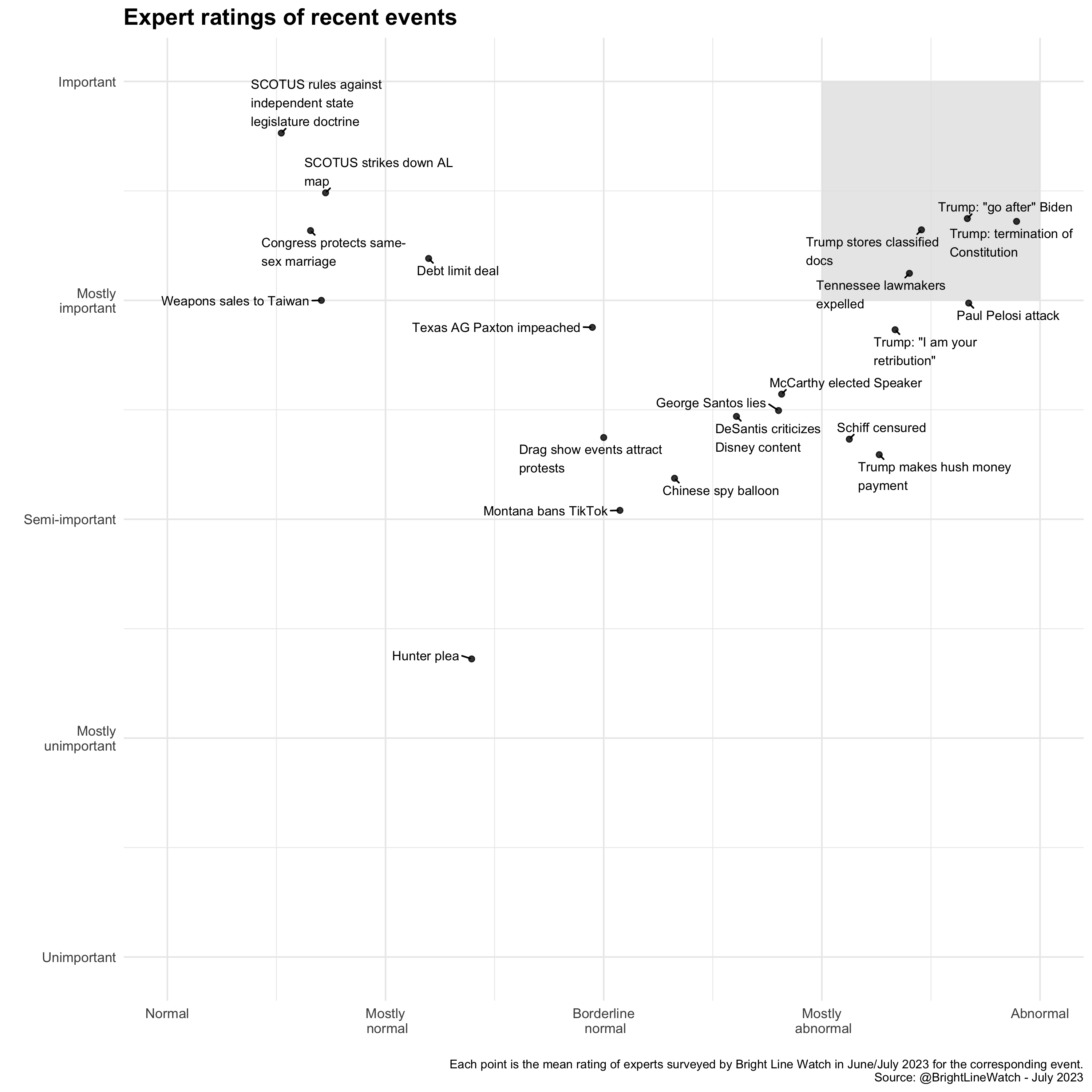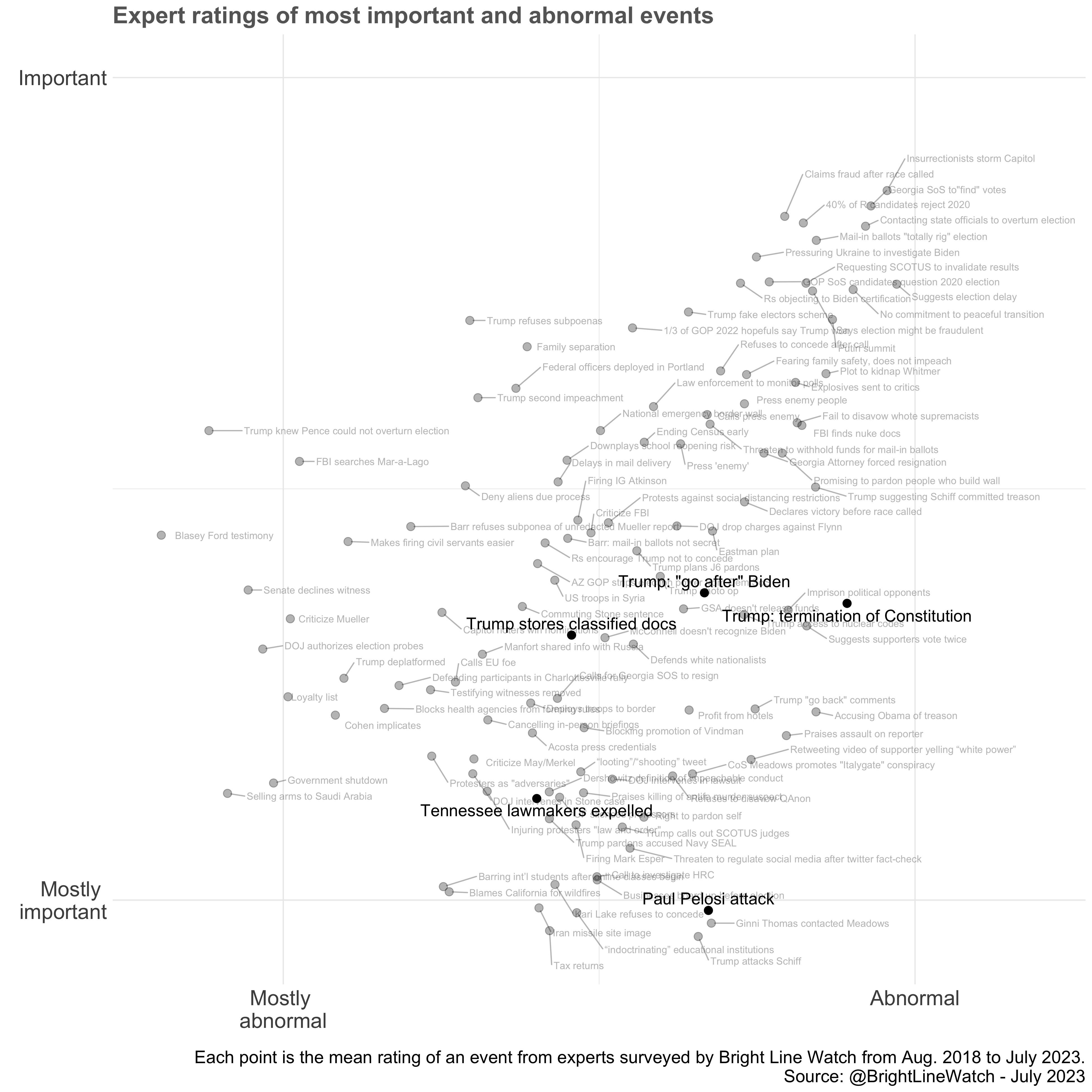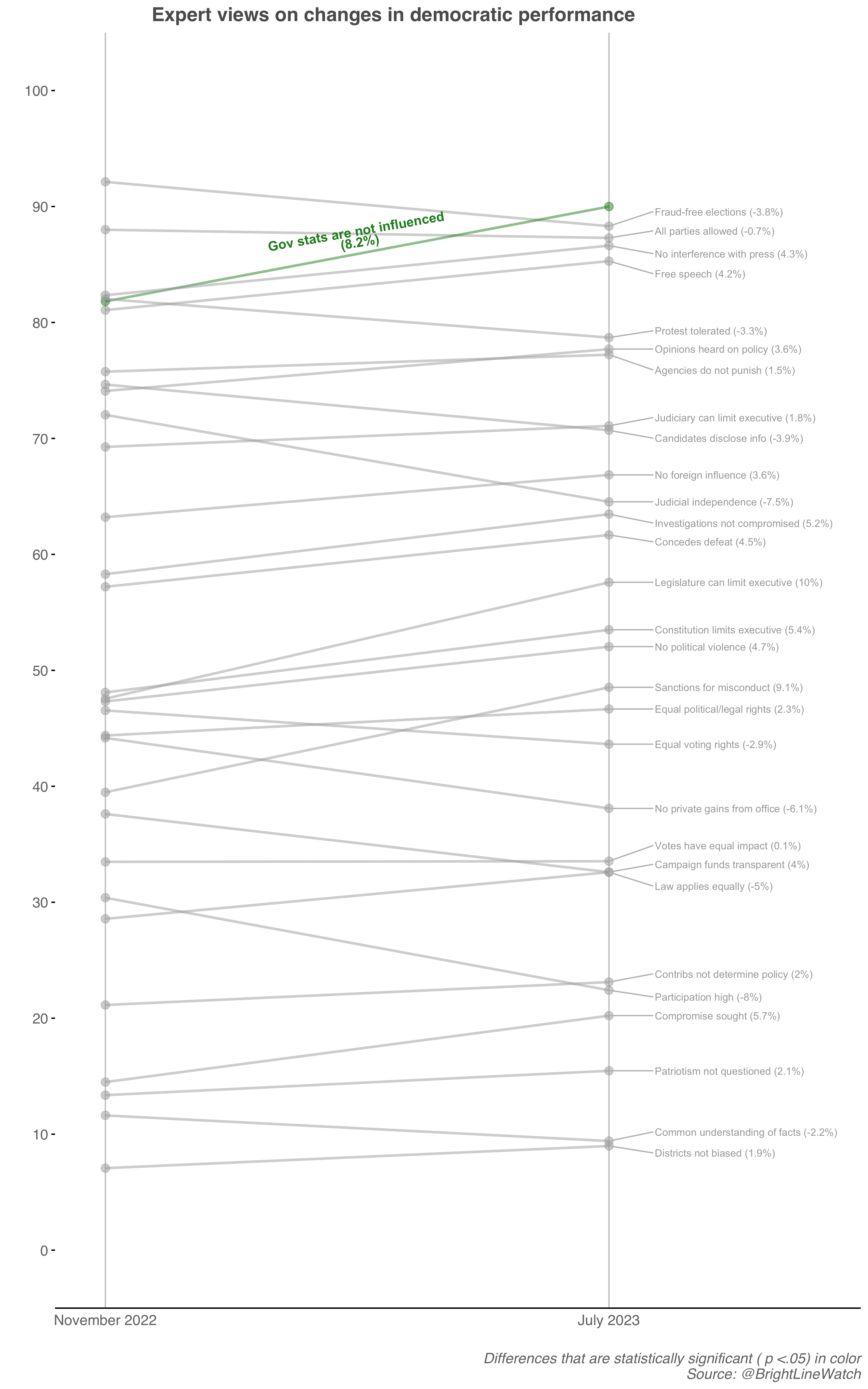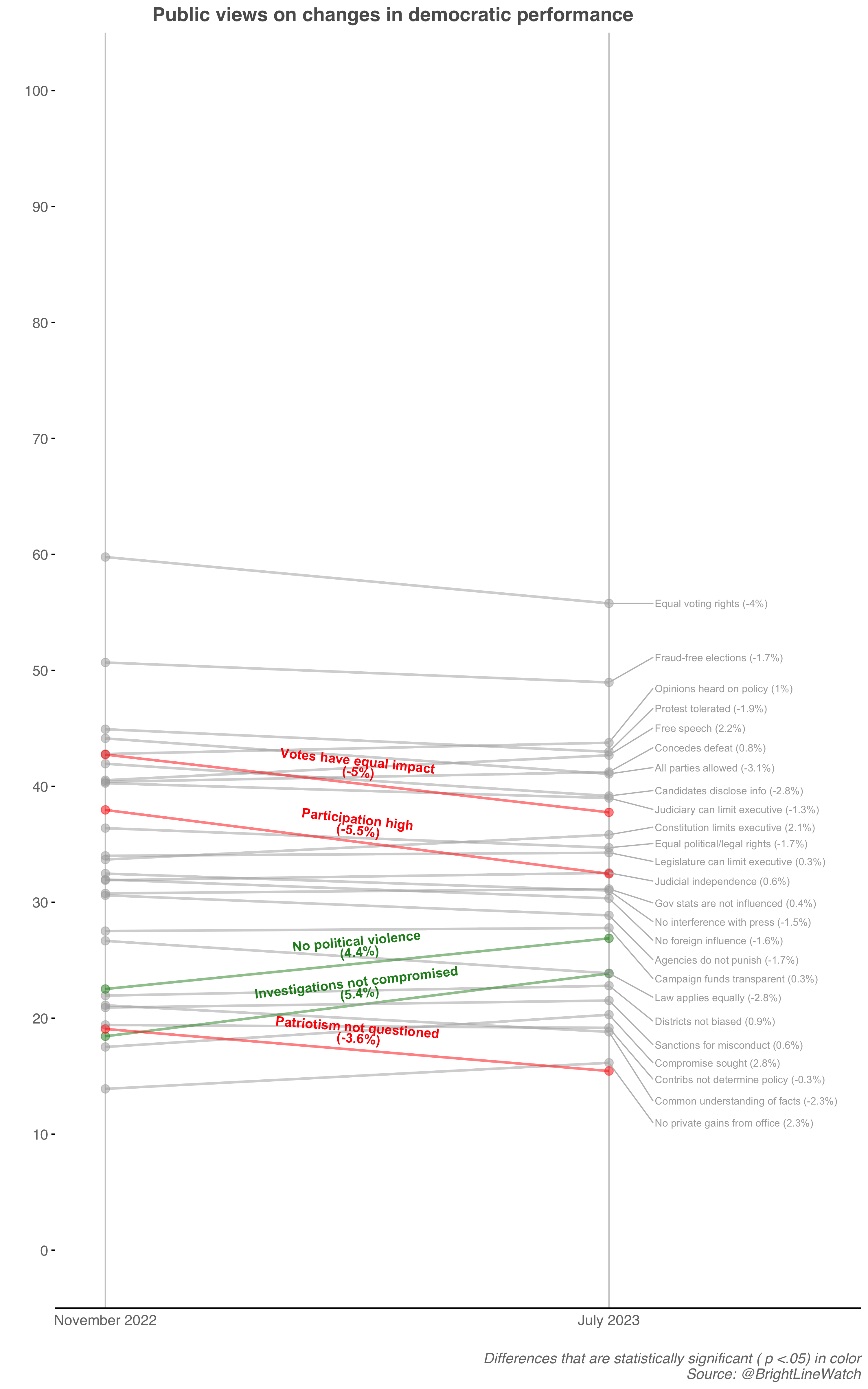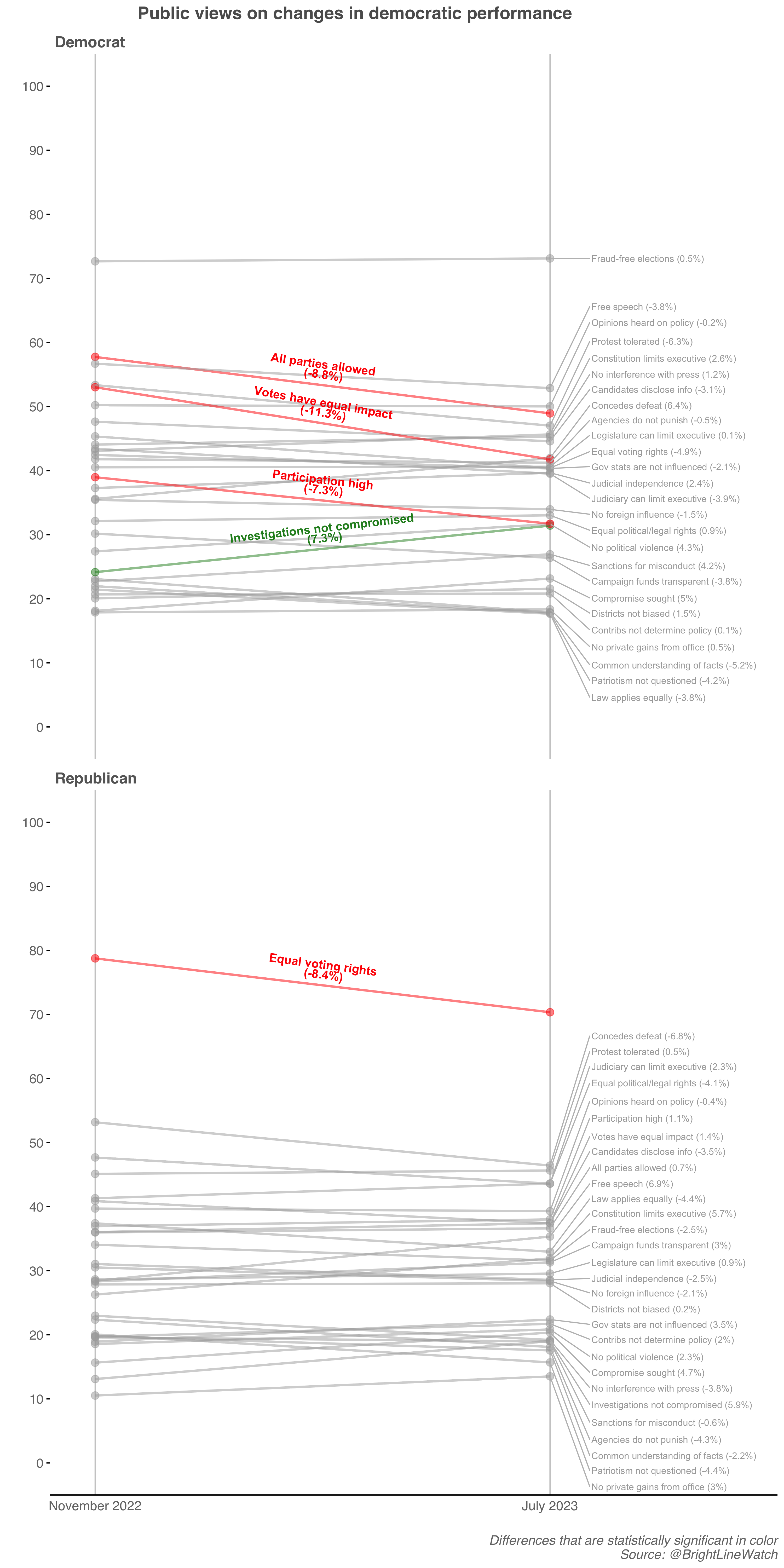Uncharted Territory: The Aftermath of Presidential Indictments
Bright Line Watch June/July 2023 surveys
American politics finds itself at a crossroads in both the Biden presidency and the aftermath of the Trump administration. Last November’s midterm elections delivered a Republican House majority, reestablishing divided government and curtailing the burst of legislative activity that marked the end of 2022. The field of Republican presidential candidates has mushroomed but formal debates will not begin until late summer. Most notably, former president Donald Trump’s legal morass has deepened as investigations into his conduct advance. In April 2023, Manhattan District Attorney Alvin Bragg indicted Trump on charges related to his payment of hush money to an adult film star during the 2016 election campaign. In June, Justice Department special counsel Jack Smith charged Trump on his handling of classified documents after leaving office. In mid-July, Trump received a “target letter” from Smith pointing toward a likely indictment related to the aftermath of the 2020 election and the events at the Capitol on January 6, 2021. The investigation by Fulton County, Georgia district attorney Fani Willis into Trump’s efforts to alter that state’s 2020 election results could result in further criminal charges.
In this context, and with attention to the potential implications of these developments for the performance of American democracy, we fielded parallel surveys of 569 political scientists and a representative sample of 2,776 Americans from June 29-July 11, 2023. Given the importance of precisely measuring Republican perceptions of topics such as the 2020 election and prosecutions of Trump, the public survey included an oversample of Republicans. The sample as a whole is weighted to be representative of the American public.
Our key findings are the following:
Perceptions of Trump investigations
-
Few Republicans believe former president Trump committed crimes in attempting to overturn the 2020 election (13%), in the events around January 6, 2021 (11%), and in falsifying business records to cover up hush money payments (15%). A somewhat larger minority (25%) believes he committed a crime in his handling of classified documents. By contrast, experts overwhelmingly believe Trump committed crimes in each of these cases (73–94%). Finally, fewer than half of all independents believe a crime was committed in each of these cases (37–46%) while Democrats overwhelmingly believe crimes were committed in each case (75–84%).
-
However, GOP beliefs that Trump violated the law in handling classified materials have risen sharply since Special Counsel Jack Smith issued detailed indictments in June 2023. The extensively documented charges about classified materials also appear to have raised the bar for establishing criminality. Respondents who were asked to consider other allegations after considering the documents charges (rather than before) were less likely to view Trump’s other actions as criminal.
-
Among Republicans, there is little support for punishment of any sort including fines or probation; majorities of partisan independents also oppose punishment. By contrast, most political science experts, and most Democrats, support prison as a punishment for Trump if allegations about classified documents, seeking to overturn the 2020 election, or involvement in January 6 events are proven true.
-
Republicans overwhelmingly endorse the proposition that Trump is being singled out for prosecution on the hush money charges (84%) and the indictment related to classified materials (82%) and that others would not be charged under similar circumstances. Among partisan independents, majorities (53% and 50%, respectively) also hold this belief, whereas far fewer Democrats do (29% and 20%). Experts are skeptical of double standard claims overall, but more than twice as many say the hush money charges would not be brought against someone else (32%) compared to the classified documents charges (15%).
-
With regard to the specific components of the classified materials indictment, political science experts and Democrats are nearly unanimous that Trump brought classified documents to Mar-a-Lago, stored them in unsecured locations, showed them to people without security clearance, and attempted to obstruct the federal investigation into the matter. Solid majorities of partisan independents also regard each charge as true. A bare majority of Republicans judges the first charge (transporting classified documents) to be true as well. Experts and Democrats support prison as punishment for these specific documents charges, as do narrower majorities of independents. Republicans are less apt to support prison but more amenable to fines or probation.
-
Nearly two-thirds of Republicans say that the next Republican president should prosecute Joe Biden and other Democrats in response to the current indictments against Trump.
Perceptions of presidential elections
-
Beliefs that Biden was the rightful winner of the 2020 election remain deeply polarized by partisanship. Among partisan independents, recognition of Biden’s win has risen in 2023, from 57% to 64%. However, a prior trend toward increasing GOP recognition of Biden’s win (from lower levels) has flattened. Within the GOP, recognition is far higher among those who characterize themselves more as supporters of the party than of Trump than among those whose primary loyalty is to Trump.
-
Beliefs in unsupported narratives about election fraud in the 2016 presidential election are persistent among both Democrats and Republicans. Democratic beliefs that Russia tampered with votes to help Trump win are higher now than they were at the end of 2016.
-
Beliefs about January 6, 2021 are deeply and increasingly polarized. Democrats – and, to a lesser degree, partisan independents – regard the events at the U.S. Capitol as a riot and an insurrection. Among Republicans, nearly 60% characterize January 6 as legitimate protest.
Perceptions of threats to democracy
-
Our political science experts are increasingly sanguine about U.S. democracy, rating its overall performance above 70 on a 100-point scale for the first time since we began asking in February 2017. Among the public, by contrast, assessments of U.S. democracy have fallen since our last survey in November 2022 (including among both Democrats and Republicans).
-
Experts regard a potential Trump nomination as the greatest current threat to American democracy and regard recent indictments of Trump as beneficial for our democracy.
-
No group – experts, Democrats, Republicans, or independents – supports altering news coverage to limit Trump’s media platform. A plurality of each believes Trump should be covered like other presidential candidates.
-
Experts regard several recent events (including Trump’s vow to appoint a special prosecutor to “go after” Joe Biden if he is re-elected) as both important and abnormal, but none are rated as comparable to Trump’s efforts to overturn the 2020 election or his actions on January 6, 2021.
-
We find no evidence that the academic experts who are likely to code the status of democracies around the world are more pessimistic on average than those experts who do not participate in such surveys.
Investigations and indictments of Donald Trump
Perceptions of Trump investigations
Former president Trump faces state charges in New York for allegedly falsifying business records to cover up a hush-money payment to adult film actress Stormy Daniels during his 2016 presidential campaign. He also faces federal charges for willfully retaining and mishandling classified documents after leaving the White House in January 2021. Both cases are pending and may not go to trial before the November 2024 election. In addition to these indictments, Trump is under investigation at the state and federal level for his attempts to overturn the results of the 2020 presidential election and his role in the events of January 6, 2021. Further indictments appear likely.
In October 2022, we probed expert and public attitudes toward the investigations that were most salient at the time — the inquiries into Trump’s attempt to overturn election results, his role in the events of January 6, and his handling of classified documents. At the time, almost all experts we surveyed believed that Trump had committed a crime in each case. By contrast, responses from the public were sharply polarized: across the three cases, 88–92% of Democrats believed that Trump had committed a crime versus just 13–16% of Republicans. Beliefs that Trump committed a crime and that he should be prosecuted were closely linked in both samples.
In our latest survey, we again asked experts and the public about the three investigations listed above as well as about the hush money case and about Joe Biden’s handling of classified documents after he left the vice presidency in 2017. We calculated the percentage of respondents who think Trump or Biden committed a crime in each case (out of the total including those who said that he didn’t commit a crime as well as those who said that they didn’t know). For items that were previously surveyed in October 2022, we also examined for changes in this belief over time.
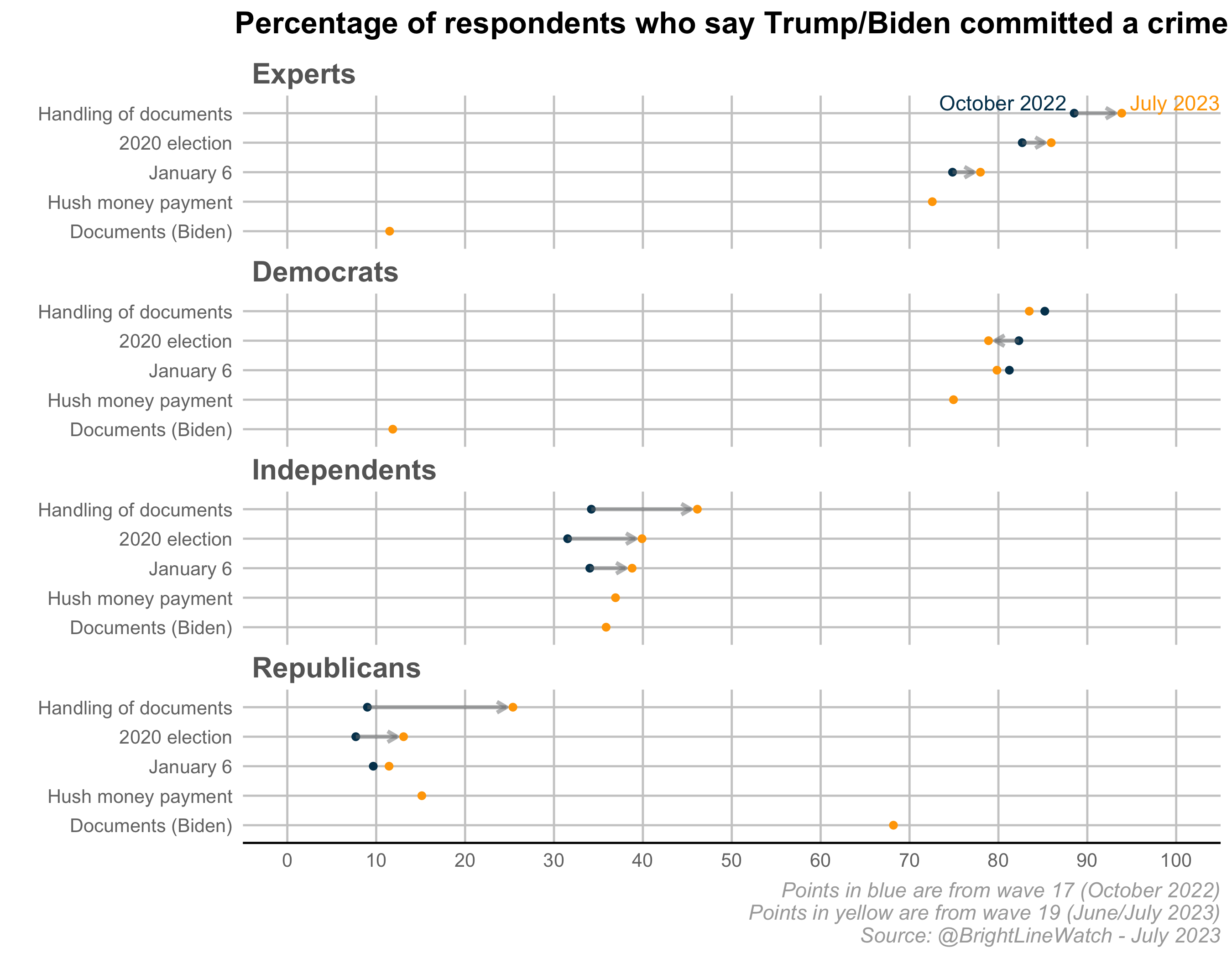
For each allegation against Trump, large majorities of both experts and Democrats believe a crime was committed. On the Biden documents allegation, only 12% of both experts and Democrats believe the same. There is, however, meaningful variation among the experts across the Trump allegation items. For instance, while nearly every political scientist in our expert sample (94%) indicated that Trump had committed a crime in relation to his handling of classified documents, only 73% said the same with regard to his payment of hush money to adult film star Stormy Daniels, the legal foundation for which has been characterized by experts as shaky (12% said no crime, 16% did not know). Belief that Trump committed a crime in the hush money case is the lowest out of the four cases in each group considered except for Republicans.
Republicans are, unsurprisingly, most skeptical of claims that Trump committed crimes (11–25%) and most confident that Joe Biden did so (68%). That said, the proportion of Republicans who believe that Trump committed a crime in his handling of classified documents increased from 9% in October 2022, when relatively little information was available, to 25% in the June-July survey, which took place after the widely-covered release of the evidence in the documents indictment. This change is the largest shift in beliefs we observe for any group across all the cases. Most Republicans (53%) still believe that Trump did not commit a crime in the documents case, but that is a much lower share than the 70% of Republicans who said the same in October 2022. This shift suggests that some parts of the GOP are responsive to evidence provided by special counsel Jack Smith.
Criminal judgments among partisan independents are similar for Trump and Biden and relatively low overall. A majority of independents does not believe a crime was committed across each of the five cases. However, belief that a crime was committed is highest (46%) for Trump’s handling of documents, which is up from 34% in October 2022.
These data also allow us to examine the distribution of perceptions for all four sets of allegations that Trump committed a crime. Experts and Republicans express nearly opposite views. Sixty percent of experts indicated that Trump committed a crime in all four cases and 21% indicated that he committed a crime in three of the four cases. In contrast, 68% of Republicans said Trump committed a crime in none of the four cases and 18% said he committed a crime in just one of the cases.
We next asked respondents who said Trump committed a crime in each of the cases about the appropriate punishment: none, a fine or probation, or a prison sentence. The figure below plots these quantities as a proportion of each group as a whole. (We pooled those who said Trump did not commit a crime and those who said he did but that he should face no punishment for doing so; the latter quantity is always negligible.) The figure thus represents the percentage of experts, Democrats, independents, and Republicans who think Trump should face a given level of punishment in each case.
More than six in ten experts support prison in each case except for the hush-money case, where 52% supported a fine or probation and another 31% said Trump should not face punishment. The pattern of support for prison time was similar for Democrats across cases. Among independents, support for prison was substantially lower and never reached 40%; majorities of independents support no punishment for every allegation. Finally, very few Republicans support Trump serving prison time. The percentage who believe he did not commit a crime or should face no punishment ranges from 76% in the documents case to 89% in the January 6 case.
The public’s attitudes toward President Biden’s handling of classified documents are somewhat less polarized. While a plurality of Republicans (40%) say that Biden should face prison time, 34% say that Biden did commit a crime or should not face any punishment. Among independents, nearly two-third of respondents (65%) say that Biden should not face any punishment. Finally, 90% of Democrats say Biden should not face any punishment. Among experts, there is a near-consensus (94%) that Biden should not face any punishment.
Finally, we asked respondents who said that Trump had not committed a crime whether they believed Trump did not do what he was accused of (i.e., the factual claims in the cases are false) or that Trump took the alleged actions but they did not amount to a crime (i.e., he is being wrongly prosecuted for actions that are not illegal). Respondents who said that they did not know if Trump had committed a crime were not asked this follow-up question.
Because most experts said that Trump had committed crimes, few of them were asked this follow-up question. Among those who were, there is little disagreement regarding the factual basis of the cases. Instead, the main defense of Trump’s conduct is to acknowledge that he did what he’s accused of but to say that these actions are not a crime. Responses among Democrats are similar. Among independents and Republicans, responses vary from case to case. For the hush money and classified documents cases, most independents and Republicans who say that Trump did not commit a crime agree that Trump’s behavior has been accurately described but does not rise to the level of criminality. In both cases, there is clear visual evidence of Trump’s conduct – namely, a check in the hush money case and widely-circulated pictures of boxes strewn around Mar-a-Lago in the classified documents case. By contrast, the main defense of Trump’s actions in the events of January 6, 2021 is that he did not engage in actions that violated the law. Finally, independents and Republicans are evenly split between those who say Trump did not take the alleged actions in attempting to overturn the 2020 election and those who maintain those actions were not criminal.
For the two cases that have so far led to indictments (the documents case and the hush money case), we also asked respondents whether they agreed that “Trump would not have been prosecuted if he were someone else.” Republican leaders, as well as Trump himself, have repeatedly argued that the indictments are politically motivated and legally flimsy. The figure below shows that this argument was endorsed by more than 4 in 5 Republicans on both charges and by a majority of independents as well. Democrats and political science experts are far less likely to endorse the claim that Trump would not have been charged if he were someone else, although it is notable that more than twice as many experts say Trump is being singled out on the hush money charges (32%) than on the classified materials indictment (15%).
We also asked our expert respondents to compare the two cases that have so far led to indictments in terms of the relative strength of evidence and the probability of conviction. 79% of respondents in our sample indicated that they believed the federal indictment in Florida to contain stronger evidence against Donald Trump, while just 2% thought the opposite. 19% said that the two indictments contained evidence of roughly equal strength. Similarly, 57% of our respondents thought that former president Trump was more likely to be convicted in the Florida case, while just 10% believed that the New York case related to hush money payment was more likely to lead to a conviction. 33% of respondents indicated that the probability of conviction was about equally likely.
Finally, we also probed our expert respondents on their views regarding the legal standards that should be applied to prosecutions of a former president. An overwhelming majority (81%) said that the evidentiary standard for prosecuting a former president should be the same as it is for regular citizens. 15% believed that the evidentiary standard should be higher. There was almost no support for the suggestions that the evidentiary standard should be lower (1%) or that former presidents should not be prosecuted at all (3%).
Perceptions of charges in the documents indictment
The indictment filed in June 2023 by special counsel Jack Smith contains a series of specific allegations regarding Trump’s handling of classified documents. With a few notable exceptions, Republican politicians have dismissed the indictment as politically motivated and continued to support Trump. However, legal experts, including former Trump attorney general William P. Barr, view the case as strong.
In the weeks after the indictment, surveys indicated that a majority of Americans viewed the charges against Trump as serious but that only a minority believed he should be charged with a crime. Polls also showed that a majority regarded the charges as politically motivated. Support for Trump has accordingly held firm: most co-partisans dismiss the charges and Trump’s standing in prediction markets as the most likely 2024 GOP presidential candidate actually strengthening after an initial decline.
To better understand the reaction of the Republican base to the indictment, we sought to distinguish between perceptions of the seriousness of the allegations and perceptions of the accuracy of the allegations. Republicans who dismiss the allegations against Trump may believe that the behavior Trump is accused of would be serious if it were true, but simply do not believe the claims in the indictment. Alternatively, they may acknowledge that Trump behaved in the way the indictment describes, but believe this behavior to be justifiable.
Accordingly, we presented both expert and public participants with four specific allegations made in the indictment:
-
Trump deliberately brought classified documents to his Mar-a-Lago resort upon leaving the White House in January 2021.
-
Trump stored classified documents in unsecured locations, including a ballroom and a bathroom at his Mar-a-Lago resort.
-
Trump showed classified documents to people who had no security clearance.
-
Trump suggested that his attorney hide or destroy classified documents before federal authorities could recover them.
For each allegation, we first asked respondents what the appropriate punishment for the actions described would be assuming that the claims are accurate. Respondents could choose from multiple options ranging from no punishment to more than five years in prison. We then asked respondents if they thought the claim was true; the answer choices ranged from “definitely true” to “definitely not true.” We first plot the percentage of respondents from each group who view each specific claim in the document case as definitely or probably true.
The vast majority of experts (98–99%) say that the charges in the indictment are definitely or probably true; 96.8% of experts indicated that all four claims were true. We do observe differences in confidence, however — 79% of experts regard the storage-of-documents charge as “definitely true,” compared to 56% for the directed-obstruction charge. The difference that is likely related to the photographic evidence for the former. Among Democrats, overall belief in the truth of the charges is nearly as high (93–96%).
Belief in the charges is lower among partisan independents, but solid majorities (68–74%) in this group also believe each charge to be true. Among Republicans, a majority (52%) believes Trump brought classified documents to Mar-a-Lago but only a minority believe each of the other charges (34–44%).
We also asked about the appropriate punishment for each charge in the case, assuming the charges are true. The figure below shows that Democrats lean toward the most severe punishment option, prison sentences of five or more years, for every charge, whereas a plurality of Republicans said Trump should face no punishment for each charge even if they were true. For instance, 25% of Republicans said that Trump directing his attorneys to hide or destroy classified documents before federal authorities could recover them is not a crime, 15% said it is technically a crime but should not be prosecuted, and 33% said Trump should face a fine or probation but not prison time. Only 27% of Republicans said this behavior would, if true, justify prison time. Attitudes among independents fell, as always, between those of partisans on either side but large majorities favored punishment of some sort, and majorities supported prison if the charges about storing or showing documents or about obstruction are true.
Experts distinguished among punishments in a more fine-grained manner. The claims that former president Trump brought documents to Mar-a-Lago upon leaving the White House and stored them in unsecured locations are perceived by experts as the least serious: experts overwhelmingly indicate these actions are crimes but only 51% and 52%, respectively, said prison time would be an appropriate punishment. However, 71% of experts state that showing classified documents to people with no security clearance warrants prison time as did 76% for directing attorneys to hide or destroy classified documents before federal authorities can recover them.
Contrast effects between cases
The AP-NORC Center has asked questions similar to those in our survey about the same set of four criminal charges or allegations against Trump. In April 2023, the percentage of respondents regarding Trump’s behavior in the classified documents case as illegal was 47%. By June, soon after charges were filed, it had increased to 53%. By contrast, perceptions that Trump committed a crime declined over the same period for each other charge or allegation – from 49% to 45% for involvement in January 6, from 53% to 50% for attempting to interfere in Georgia’s vote count, and from 41% to 35% for covering up hush money payments.
The increase in perceptions of criminal behavior in the documents case likely reflects exposure to coverage of the thoroughly documented evidence in that indictment, but why did perceptions of criminal behavior in the other cases decline? One possibility is a contrast effect in which the vivid narrative and visual evidence presented in the documents case makes the other cases look less compelling. In our survey, randomized variation in the order participants were asked about the various allegations provides leverage to test for such a contrast effect. Our expectation is that a prior reminder of the documents case will change how participants evaluate the other charges or allegations.
The figure below illustrates the percentage of expert and public respondents judging Trump to have committed a crime in the three other cases based on whether they were asked about the case before or after being asked about Trump’s handling of classified documents.
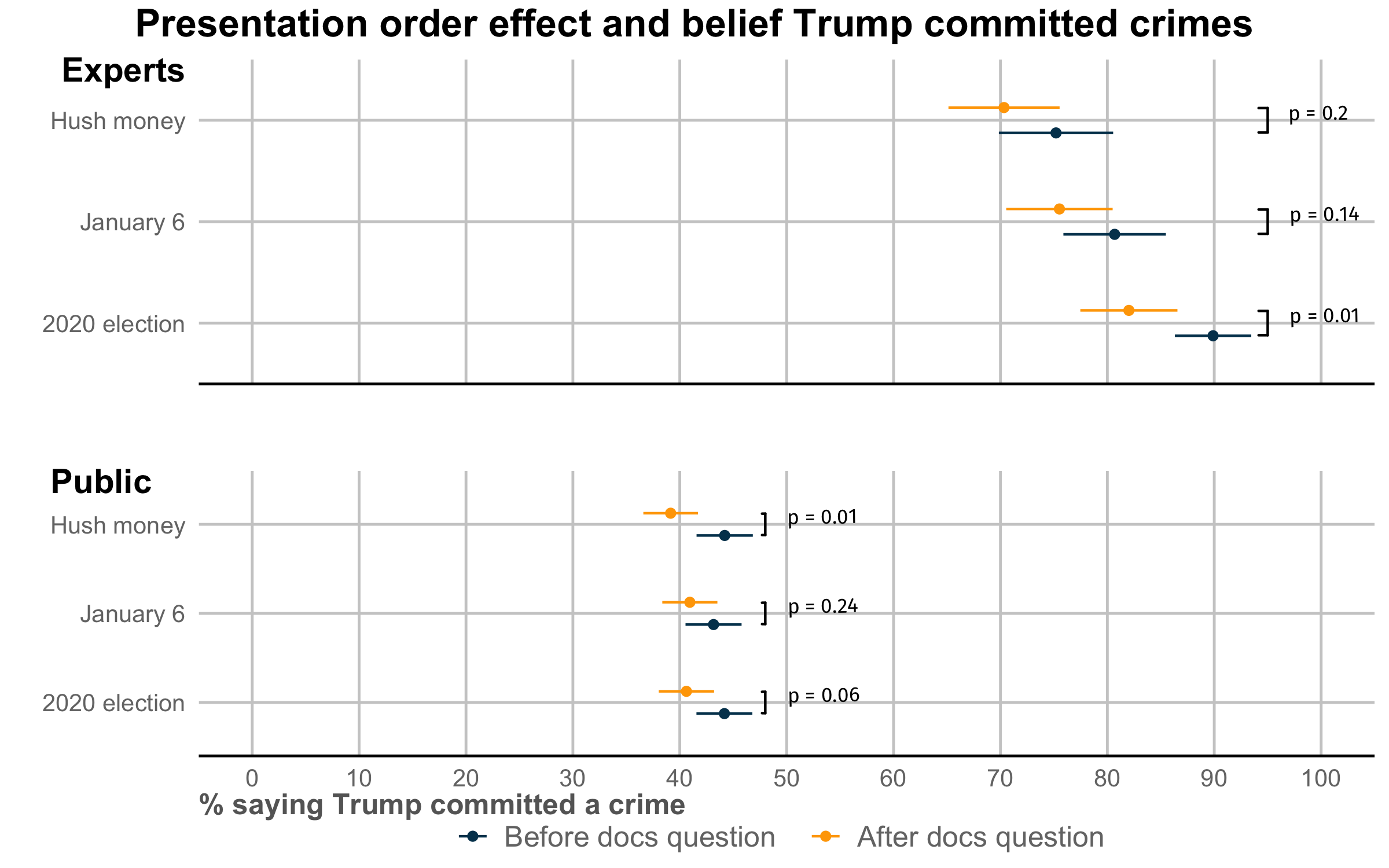
For every non-documents allegation, respondents who had previously considered the documents charges were less likely than those who had not to say Trump had committed a crime among both experts and the public. Considering the documents charges first reduced reported belief that Trump committed a crime in interfering in the 2020 election from 90% to 83% among experts and from 44% to 41% among the public. Similar declines were observed for Trump’s actions on January 6, 2021 (81% to 75% among experts, 43% to 41% among the public) and his actions related to the hush money payment to Stormy Daniels (75% to 70% among experts, 44% to 39% among the public). Every shift is in the expected direction. The detailed and extensively documented charges related to classified materials establish a high evidentiary standard that could shape perceptions of other cases against Trump.
Public demand for reprisal
On June 13, 2023, the night of his arraignment in Florida, former president Trump held a rally at his Bedminster golf club and declared that if reelected, he would “appoint a real special prosecutor to go after the most corrupt president in the history of the United States of America, Joe Biden, and the entire Biden crime family.” In parallel, Republicans in Congress have sought to investigate President Biden and his family. Statements and actions like these have lent credence to worries by observers that prosecuting Trump could backfire and lead to a cycle of partisan prosecutions that would further politicize the criminal justice system. Our experts do not seem concerned about this prospect given the punishments they expressed support for above. As we describe later in this report, fewer than 10% of them consider the indictments to be a threat to democracy. And in our October 2022 survey, among experts who indicated that Trump had committed a crime in three different cases, about 90% favored prosecuting him.
Should we be concerned about the risk of a cycle of partisan prosecutions? As students of Latin American politics know, once the cycle starts it can be hard to break. We asked respondents in our public sample whether they agreed that “the next Republican president should bring criminal charges against Joe Biden and other Democrats in response to the indictments of former president Donald Trump.” Among Republicans, 41% said they “strongly” agreed and an additional 23% said they “somewhat” agreed. In other words, nearly two-thirds of Republican respondents are in favor of some sort of prosecutorial reprisal against President Biden. To be sure, Republican respondents may genuinely believe that Biden has committed crimes and that he should be prosecuted for them regardless of what happens to former president Trump. Additionally, it is plausible that Republicans would pursue politically-motivated investigations of Biden and other Democrats regardless of Trump’s legal travails. Nonetheless, these data seem to indicate an embrace among Republicans of using investigations as a tool for retribution.
Public confidence in elections
We asked our public respondents a series of questions to measure their confidence in American elections and institutional processes around them.
Belief that Biden is the rightful winner
Since November 2020, we have asked Americans if they believe Joe Biden was the rightful winner of the 2020 presidential election. During the year following the election, attitudes in the GOP barely budged: across four consecutive survey waves between November 2020 and November 2021, only about 25% of Republicans indicated that they believed Biden was “definitely” or “probably” the rightful winner. Recent evidence suggests that these survey responses cannot be explained by expressive responding: two studies show that Republicans appear to genuinely believe that Biden was not the rightful winner. However, in surveys conducted immediately before and after the November 2022 midterm elections, we detected a meaningful shift; agreement that Biden was rightfully elected in 2020 increased to approximately 35% among Republicans. Furthermore, CNN found that while most Republicans still doubted Biden’s win, a growing share conceded that their view was based on “suspicion only” rather than “solid evidence.”
Our June/July 2023 survey again asked respondents whether they believed that Biden had been rightfully elected. The figure below shows the share of respondents across different partisan groups who state that Biden was “definitely” or “probably” the rightful winner of the election. Agreement with this statement remains stable, and nearly unanimous, among Democrats. Around three-quarters of Republicans rejected Biden’s win for at least a year following the 2020 election, but between November 2021 and November 2022, we observed an increase among Republicans, with around one-third recognizing Biden’s electoral legitimacy. That trend has flattened again, however, and the proportion of Republicans who see Biden as rightfully elected remains at 36%. By contrast, partisan independents show an increase on this metric from 57% in November 2022 to 64% in June/July 2023. Although true independents represent a relatively small segment of the population (19%), their increased confidence in electoral integrity is welcome news for American democracy.
Losing parties express more dissatisfaction with election systems in every democracy. In the case of the 2020 U.S. election, however, elites have amplified rather than dampened those sentiments – most notably, Donald Trump himself, the losing candidate in 2020 and leading candidate for the next Republican presidential nomination. As a result, these deep suspicions are likely to persist through the 2024 election, which is fast approaching. The figure above also disaggregates Republicans we surveyed since October 2022 by whether they indicated that they are more of a supporter of Trump (45–48% of Republicans and Republican leaners across the three surveys) or more of a supporter of the Republican Party (52–55%). As the results show, only about one in five Republicans who indicates a primary allegiance to Trump views Biden as the rightful winner of the 2020 election. By contrast, approximately half of Republicans who say they are more of a supporter of the party believe Biden was legitimately elected. This breakdown, too, has been largely stable since last fall.
In combination, these results offer notes of both optimism and caution. Republicans whose primary allegiance is to the party are less likely to doubt the 2020 election – belief in Biden’s victory is 48% in June/July 2023, compared with 36% for the party as a whole. At the same time, the issue continues to split even the wing of the party that is less loyal to Trump.
We noted above that CNN found declines over time in Republican certainty that Biden’s victory was illegitimate. Our survey question on the rightful winner in 2020 includes four response options that can provide more insight. The figure below disaggregates Republican respondents who doubt Biden’s victory by plotting the percentage of Republicans who say that Biden “definitely” did not win the election rightfully versus the share who say that Biden “probably” did not do so.
We find a substantial decline in the share of Republicans who express the highest level of certainty that Biden was not rightfully elected. From November 2020 to November 2022, the percentage of Republicans asserting with certainty that Biden was not the rightful winner declined from 50% to 38% but then held steady in our June-July 2023 survey. The share of Republicans who say that Biden was probably not the rightful winner of the 2020 election has been stable at around 25% across that entire span.
Perceptions of fraud and manipulation in 2016
To assess the likely durability of 2020 election denial, we also consider the long-term persistence of false beliefs about the 2016 election. During and after the campaign, the presidential candidates from both major parties cast doubt on the results of the election: then-candidate Trump repeatedly asserted that the vote count could not be trusted before the election and, even after winning, as president-elect, continued to claim that “millions of people voted illegally.” Hillary Clinton stated in 2017 that she would not rule out questioning the legitimacy of the election if Russian interference proved deeper than what was then known and later called Trump an “illegitimate president.”
Our June-July 2023 survey included two questions about these baseless claims regarding the 2016 election. The first asked respondents whether they believe millions of illegal votes were cast in the 2016 election, a false claim echoing Trump that we expect to be congenial to Republicans. The second, which is congenial to Democrats, asked respondents whether they believed that Russia tampered with vote tallies during the 2016 election to get Trump elected, a false claim that was debunked by the Senate Intelligence Committee. We plot the percentage of respondents who say each claim is “definitely” or “probably” true by party (including leaners) below.
Even years after these false claims were debunked, millions of Americans still subscribe to them. Most notably, Democrats, the losing side in 2016, were the most likely to endorse a false claim about that election — 54% said it was definitely or probably true that Russia tampered with votes to get Trump elected, compared to just 33% of independents and 16% of Republicans. The partisan gradient is less sharp for the millions of illegal votes claim, which may reflect that it was a claim made by Trump about an election that he won. In that case, 45% of Republicans say the claim is definitely or probably true, compared to 36% of independents and 30% of Democrats.
The figure below directly compares belief in these claims with polling data collected in December 2016 as part of the YouGov/Economist poll. To facilitate comparison with the reported results from that poll, we restrict these results to identified partisans only (i.e., leaners are excluded).
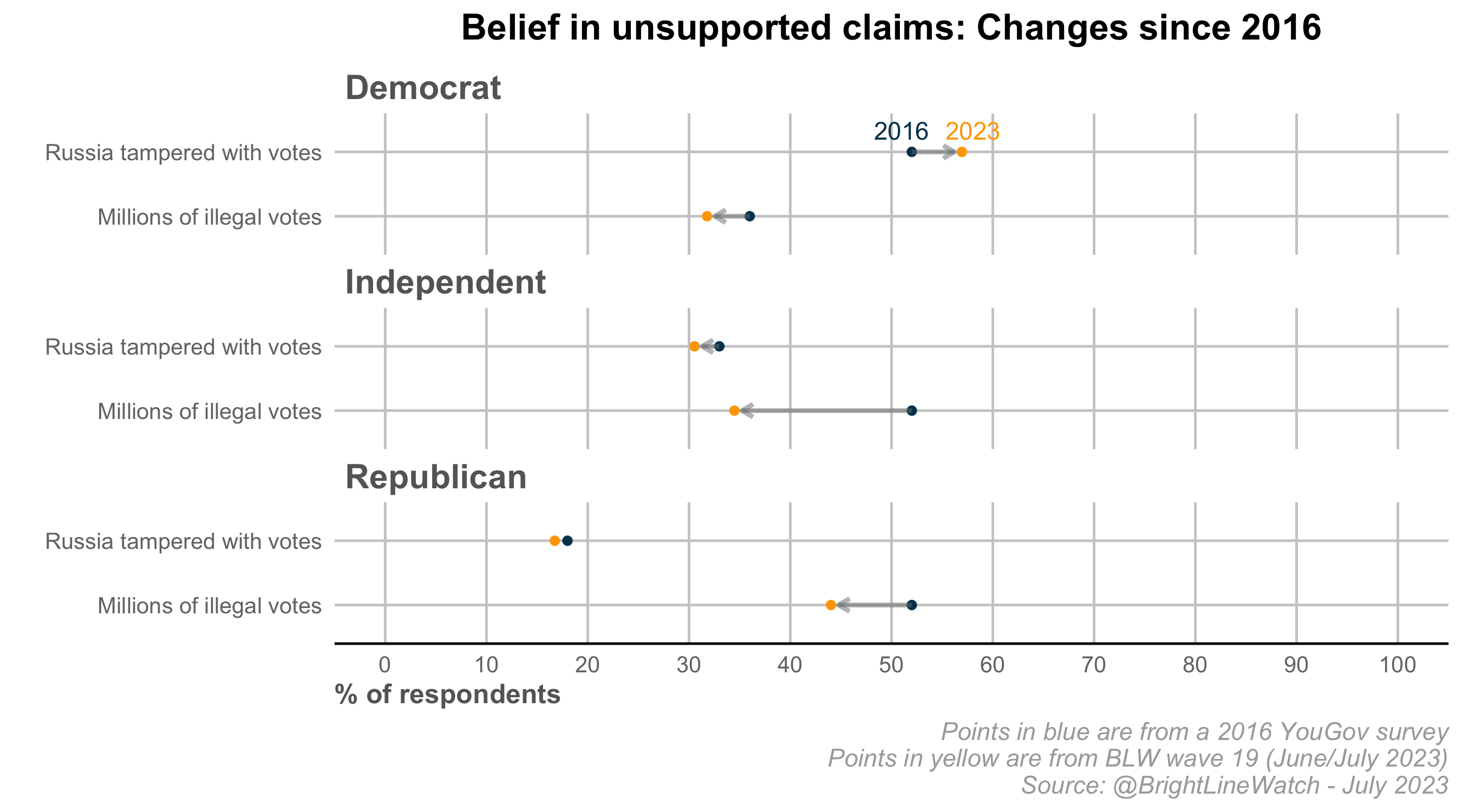
Among Republicans and independent voters, both beliefs have declined over time, with larger movement on the claim of millions of illegal votes, which decreased from 52% to 44% among Republicans and 52% to 34% among independents. However, expressed belief among Democrats in Russian vote tampering increased from 52% in 2016 to 57% in 2023. These claims have been far less salient to American politics than denial of the 2020 election results but belief in them have proven no less persistent.
Perceptions of January 6
We next consider public perceptions of the attack on the U.S. Capitol on January 6, 2021 by supporters of then-President Trump — the culminating event in the effort to overturn the results of the election. The events of that day have become a touchstone for beliefs about the integrity of American elections and the institutional procedures that support them. To date, more than 1,000 people have been charged with crimes for their actions on that day, but a wave of revisionist history has sought to recast the storming of the Capitol in a more favorable light. Most notably, House Speaker Kevin McCarthy gave “exclusive” surveillance footage access to former Fox News host Tucker Carlson, who minimized the violence of that day and made numerous false claims. Carlson has repeatedly promoted conspiracy theories about the events of January 6, including claiming that a man named Ray Epps was a government agent who instigated the violence.
In our survey, we mentioned “the incident at the U.S. Capitol on January 6, 2021” and separately asked respondents whether it is appropriate or not appropriate to describe it as a legitimate protest, as a riot, and as an insurrection. Prior polling by the Monmouth University Poll found that the percentage of respondents saying the events of January 6 were an insurrection declined from 56% in June 2021 to 47% in May 2023. Over that period, Republicans in particular became much less likely to call the events an insurrection (from 33% to 15%) or a riot (from 62% to 44%). The results we found in June/July 2023 are presented below.
As the figure indicates, 58% of Republicans said it is appropriate to call the events of January 6, 2021 a legitimate protest — even higher than the 51% recorded by Monmouth in May. They are correspondingly less likely to say it is appropriate to call it a riot (49%) or an insurrection (26%). Democrats, by contrast, overwhelmingly say it is appropriate to call January 6 a riot (85%) or an insurrection (84%); very few say it is a legitimate protest (17%). In short, perceptions of January 6 appear to be further polarized in the summer of 2023 than ever.
Assessments of American democracy and threats to it
Current and future democratic performance
As in each Bright Line Watch survey, we asked both expert and public respondents to rate the overall performance of U.S. democracy on a 0–100 scale. Expert ratings, which increased in November 2022 after the midterm elections, rose further by June/July 2023, reaching an all-time high in the 2017–2023 period of 70.3. This change may be attributable to the federal charges filed against former President Trump, which experts view as convincing (see above) and a benefit to democracy (see below). By contrast, ratings of U.S. democracy fell compared to November 2022 among both Democrats (from 61.0 to 57.5) and Republicans (from 57.3 to 54.4).
We also asked respondents to anticipate the future performance of U.S. democracy in 2027 and 2032. The results, plotted below, show that both experts and the public anticipate democratic decline in future years. The decrease among the public is driven by Republicans (from 54.4 today to 50.9 in 2027 and 48.3 in 2032) whereas Democrats anticipate stability. It is also worth noting that, although experts project mild erosion in the years ahead, that group has grown more optimistic overall since October 2022, the last time we asked our expert and public samples for democratic projections. Experts rate American democracy higher now than they did last year (70.3 rather than 66.6) and their future projections are correspondingly higher. By contrast, current and projected future ratings have remained stable among the public, including among both Democrats and Republicans. (For clarity, the figure shows the October 2022 projections only for the experts.)
Threats to American democracy
We asked our experts to consider a series of events, some of which have already happened and others that could materialize in the future, and to assess the impact, if any, that each has had, or could have, on U.S. democracy. The set of events that have already occurred are the following:
-
Former president Donald Trump is indicted by New York County District Attorney Alvin Bragg for falsification of business records in relation to a hush money payment to Stormy Daniels during the 2016 election campaign
-
Former president Donald Trump is indicted by special counsel Jack Smith over his handling of classified documents after leaving the White House
-
Numerous Republican candidates enter the 2024 presidential race, joining Donald Trump, Ron DeSantis, and Nikki Haley
-
Senator Dianne Feinstein refuses to resign and returns to Washington following a lengthy health-related absence
-
President Joe Biden calls MAGA Republicans “semi-fascist”
-
The group No Labels seeks to secure ballot access to potentially challenge the major-party presidential candidates next year
-
The House Committee on the Weaponization of the Federal Government conducts investigations and holds hearings
The events that could occur in the future are the following:
-
Donald Trump is nominated as the Republican candidate for president ahead of the 2024 elections
-
Ron DeSantis is nominated as the Republican candidate for president ahead of the 2024 elections
-
Joe Biden is nominated as the Democratic candidate for president ahead of the 2024 elections
For each event, experts were first asked to indicate whether they believed it to be a benefit to American democracy, a threat to American democracy, or whether it would not affect American democracy, with a follow-up on the degree of benefit or threat. The figure below shows the items in descending order of perceived threat to democracy. The right panel shows the percentage of experts who indicated that an event would not affect American democracy.
As in past surveys, the prospect of Donald Trump being nominated as the Republican candidate for the presidency (as is now considered likely) causes deep concern among our experts. More than 9 in 10 experts say that his nomination is a threat to American democracy, including 80% who says that the threat is extraordinary or serious. The near-consensus on this issue is not surprising. Whereas former president Trump’s first term was by all measures norm-shattering, many have raised concerns that a potential second term could be even more perilous for American democracy, given his avowed message of revenge and the prospect that he could be more effective in wielding government power.
The prospect of Florida governor Ron DeSantis being nominated as the Republican candidate for president also attracts concern, though less than Trump. 55% of our expert sample say that a DeSantis nomination would be a threat to democracy, including 42% who say he presents an extraordinary or serious threat. On the other hand, about a third of experts say that a DeSantis nomination would not affect American democracy. These divisions reflect differences between experts who say DeSantis has sought to use the power of the state to pursue his political agenda and critics who view concerns about DeSantis as overstated. By contrast, a Biden nomination elicits little concern from our experts – 67% say it would not affect American democracy one way or the other.
Other than a potential Trump nomination, experts expressed the most concern about the U.S. House of Representatives’ Select Subcommittee on the Weaponization of the Federal Government. This committee, which was formed following the Republican takeover of the House of Representatives in the 2022 midterm elections, states that it seeks to investigate purported abuses of power against conservatives by federal government agencies, including the FBI and the Department of Justice. 57% of experts viewed it as a threat, including 28% who rated the threat as extraordinary or serious.
Finally, most experts rate the indictments of former president Trump in Florida and New York as benefits to democracy. The consensus is much stronger, however, for the indictment related to the handling of classified documents in Florida. 85% of experts say the indictment will benefit democracy, compared to 54% for the hush money indictment in Florida. As discussed above, few experts consider either indictment to be a threat to democracy, suggesting relatively little concern about sparking a cycle of retribution.
Media coverage of Trump
Trump’s position in American politics is without precedent. He is the front-runner for the Republican presidential nomination and also widely regarded as a profound threat to our democracy. Experts and the media frequently debate how to balance these two considerations in covering Trump-related news, especially when covering events like the widely-criticized CNN town hall in which outlets give a platform to Trump as he repeatedly makes false statements. We therefore asked both our expert and public samples how Donald Trump’s candidacy in the 2024 presidential election should be covered.
There is consensus across groups that Trump should be covered like other candidates, including 56% of experts. Even a plurality (45%) of Democrats says Trump should be covered like other candidates. Support for minimizing coverage of contexts in which Trump can speak unfiltered is highest among experts (31%). Few respondents in any group, including just 13% of experts, say that the media should minimize all coverage of Trump.
Are democracy assessments biased toward pessimism?
Expert assessments are central to research on democratic erosion, including our own approach at Bright Line Watch in studying the United States. However, a recent working paper by the political scientists Andrew Little and Anne Meng has raised concerns over this scholarly approach. Little and Meng argue that expert assessments of democracy worldwide should be complemented with what they characterize as more objective, measurable indicators such as the incumbent turnover rate. Whereas expert assessments show democratic decline in recent years, Little and Meng find no such pattern in their proposed indicators. To explain the discrepancy, they suggest that “changes in the media environment or changing coder standards may have led to a time varying bias in expert surveys which makes it appear the world is getting less democratic than the true trend.” If that’s the case, then pessimistic conclusions regarding the state of democracy across the world may not be warranted.
To advance this debate, we sought to determine whether the political scientists who generate expert assessments in our surveys are systematically biased toward democratic pessimism. Using questions designed in collaboration with Little and Meng, we asked respondents whether they had ever been invited to serve as a coder for V‑Dem, the most ambitious cross-national measure of the state of democracy across countries. We also asked whether they had served (if invited) and about willingness to serve (if not invited). Of 544 expert respondents who completed this section of our survey, 484 (89%) had never been invited to serve as V‑Dem coders; 16 (3%) had been invited but did not participate; and 44 (8%) had been invited and served as coders. Of those who had never been asked to participate, 227 (48%) expressed to participate if asked.
Prior to being asked about V‑Dem participation, our expert respondents had rated, on a 100-point scale, the quality of democracy in a random subset of six countries around the world in addition to the United States from the following set: Brazil, Hungary, India, Israel, Italy, Kenya, Mexico, Peru, Philippines, Poland, Turkey, and the United Kingdom.
Expert coder bias could operate either through V‑Dem invitations (if experts who are invited are more pessimistic than experts who are not invited) or through self-selection (if experts who choose to participate are more pessimistic than experts who decline). The next figure shows the average ratings for each country. The left panel compares ratings from expert respondents in our sample who had and had not been invited by V‑Dem. The right panel compares ratings from those willing versus unwilling to participate with V‑Dem.
We find no evidence of bias toward pessimism at either stage of selection into the V‑Dem coder pool. Average democracy ratings among those who were invited to code for V‑Dem were actually higher than the average ratings among uninvited experts for 12 or 13 countries (excepting only Turkey; the difference reached statistical significance for Brazil and Peru). With regard to participation, average ratings were higher among those willing to code for V‑Dem than among those who are unwilling for all 13 countries, with statistically significant differences for the United States, Brazil, Mexico, and Poland. Overall, the political scientists whom V‑Dem invites and those inclined to participate if asked appear more sanguine, not less, about democracy around the world than are experts outside that V‑Dem coder pool.
We note, however, that experts who code for V‑Dem rate specific countries on which they have the greatest expertise. Our survey sample unfortunately does not include enough V‑Dem coders who also rated their specific country of expertise in our survey to allow comparison with ratings from the broader set of political scientists. Second, our sample of political scientists may itself be vulnerable to self-selection bias; it is possible that experts who decline to take part in our survey hold systematically different attitudes from those who do. Finally, it is also possible that political science as a whole is unduly pessimistic about democracy across the world, in which case the baseline against which we are comparing V‑Dem coders does not reflect a ground truth about democracy around the world. If such a bias were new, or grew, in recent years, it could cause a universal shift in coder standards that our approach might not detect.
Events
We continue to ask experts to separately rate recent events as normal or abnormal and as important or unimportant. The complete list of events (with the exact text shown to respondents) is provided in the appendix; average ratings provided by our experts are plotted on the figure below.
Experts rate several recent events as mostly important or higher on average and mostly normal on average, including the Supreme Court rulings on the independent state legislature doctrine in Moore v. Harper and on Alabama Congressional district boundaries in Allen v. Milligan. The Hunter Biden plea deal is seen as relatively normal and unimportant.
Most notably, four events stand out as being rated as mostly important or greater and mostly abnormal or greater on average by experts – Tennessee Republicans expelling two Democratic lawmakers from the state legislature for their role in a pro-gun control protest in the chamber of the state, Donald Trump storing classified documents he was not allowed to retain after leaving office in his Mar-a-Lago estate, Trump’s statement in a social media post that election fraud “allows for the termination of all rules, regulations, and articles, even those found in the Constitution,” and Trump’s vow to appoint a special prosecutor to “go after” Joe Biden if he is reelected.
However, it is important to put these events into context of the set of important and abnormal events that experts have rated in prior Bright Line Watch surveys. The figure below zooms in on the top right portion of the graph above — the area in which events appear that are rated mostly important or greater and mostly abnormal or greater on average by experts.
In the broader context of the post-2016 era, these four events, while important and abnormal, are not rated as nearly as important and abnormal as, for instance, the storming of the Capitol on January 6, Trump asking the Georgia Secretary of State to “find” votes, or Trump contacting state officials to ask them to overturn the election.
Appendix
Bright Line Watch conducted its nineteenth survey of academic experts from June 28-July 12, 2023 and its sixteenth survey of the general public from June 29-July 7, 2022. Our public sample consisted of 2,776 participants from the YouGov panel who were selected and weighted to be representative of the U.S. adult population. We also surveyed 569 political science experts across a diverse range of subfields. Our email list was constructed from the faculty list of U.S. institutions represented in the online program of the 2016 American Political Science Association conference and updated by reviewing department websites and job placement records from Ph.D. programs in the period since.
All estimates shown in the report used weights provided by YouGov. Our expert sample is unweighted because we do not collect demographic data to protect anonymity. Error bars in our graphs represent 95% confidence intervals. Data are available here.
Both the expert and public samples in Wave 18 responded to a battery of questions about democratic performance in the United States. Afterward, they were asked to evaluate the quality of American democracy overall on a 100-point scale.
How well do the following statements describe the United States as of today?
- The U.S. does not meet this standard
- The U.S. partly meets this standard
- The U.S. mostly meets this standard
- The U.S fully meets this standard
- Government officials are legally sanctioned for misconduct
- Government officials do not use public office for private gain
- Government agencies are not used to monitor, attack, or punish political opponents
- All adult citizens enjoy the same legal and political rights
- Government does not interfere with journalists or news organizations
- Government effectively prevents private actors from engaging in politically-motivated violence or intimidation
- Government protects individuals’ right to engage in unpopular speech or expression
- Political competition occurs without criticism of opponents’ loyalty or patriotism
- Elections are free from foreign influence
- Parties and candidates are not barred due to their political beliefs and ideologies
- All adult citizens have equal opportunity to vote
- All votes have equal impact on election outcomes
- Elections are conducted, ballots counted, and winners determined without pervasive fraud or manipulation
- Executive authority cannot be expanded beyond constitutional limits
- The legislature is able to effectively limit executive power
- The judiciary is able to effectively limit executive power
- The elected branches respect judicial independence
- Voter participation in elections is generally high
- Information about the sources of campaign funding is available to the public
- Public policy is not determined by large campaign contributions
- Citizens can make their opinions heard in open debate about policies that are under consideration
- The geographic boundaries of electoral districts do not systematically advantage any particular political party
- Even when there are disagreements about ideology or policy, political leaders generally share a common understanding of relevant facts
- Elected officials seek compromise with political opponents
- Citizens have access to information about candidates that is relevant to how they would govern
- Government protects individuals’ right to engage in peaceful protest
- Law enforcement investigations of public officials or their associates are free from political influence or interference
- Government statistics and data are produced by experts who are not influenced by political considerations
- The law is enforced equally for all persons
- Incumbent politicians who lose elections publicly concede defeat
The figure below breaks out performance ratings on each of 30 democratic principles. The markers for each principle indicate the percentage of expert (green) and public (purple) respondents who regard the United States as fully or mostly meeting the standard (as opposed to meeting it partly or not at all). Consistent with the overall ratings, the experts rate U.S. democratic performance more positively than the public overall. Few exceptions exist, however, such as voting rights being equally protected for all citizens, politicians operating with a common understanding on factual matters, and electoral districts not systematically favoring one party over the other.
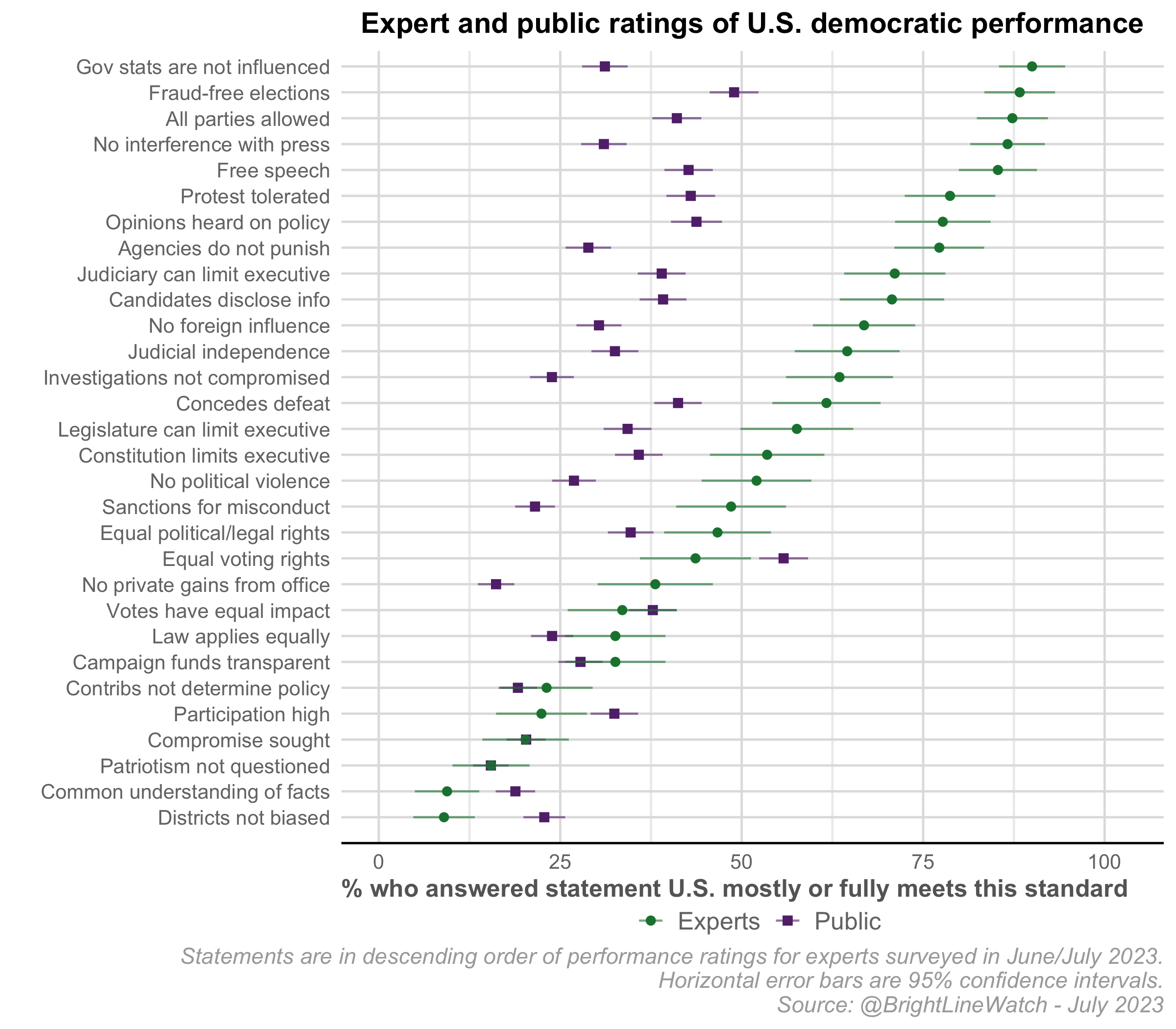
The next figure shows performance assessments on the same 30 principles for the public sample only by respondent partisanship. On some principles, middling overall public assessments hide stark partisan polarization.
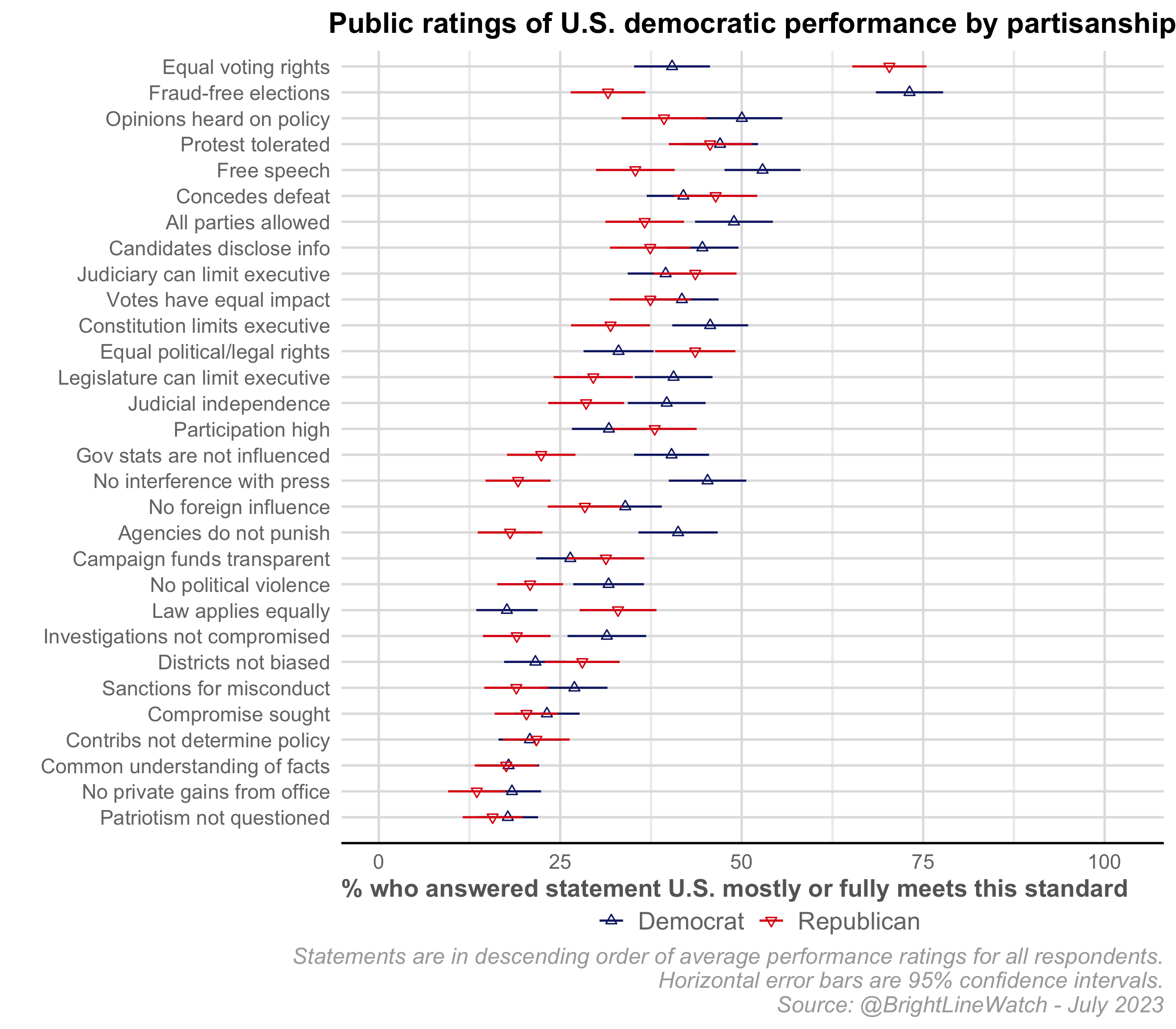
Additional components of expert survey
Political events
In this series of questions, we ask how normal or abnormal and how important or unimportant recent political events are.
Is this normal or abnormal?
- Normal
- Mostly normal
- Borderline normal
- Mostly abnormal
- Abnormal
Is this unimportant or important?
- Unimportant
- Mostly unimportant
- Semi-important
- Mostly important
- Important
Events list
- Tennessee Republicans expel two Democratic lawmakers from the state Legislature for their role in a protest calling for more gun control
- Speaking about a potential second term, former president Trump declares: “I am your justice. And for those who have been wronged and betrayed, I am your retribution.”
- A few days before the U.S. was set to default on its debt, congressional Republicans and the Biden administration agree on a deal to raise the debt ceiling in exchange for spending limits
- The Supreme Court strikes down Alabama’s congressional map because it limited the political power exercised by Black voters
- As the issue of LGBTQ rights rises in salience, drag show events in multiple states attract protests
- The U.S. Congress passes a bill that protects same-sex marriage
- A journalistic investigation reveals that George Santos, recently elected to represent New York’s 3rd congressional district, repeatedly lied about his resume during the campaign
- A Chinese spy balloon traverses the continental U.S. before the U.S. military shoots it down over the Atlantic Ocean
- The Biden administration approves the sale of over $600 million worth of weapons to Taiwan as tensions mount with China
- Montana bans the popular mobile application TikTok amid mounting concerns about user privacy and its Chinese ownership
- Texas Attorney General Ken Paxton, a Republican, is impeached by the Republican majority in the state House of Representatives following accusations of bribery and obstruction of justice
- Former president Donald Trump vows to appoint a special prosecutor to “go after” Joe Biden if he is re-elected
- Following a lengthy confrontation with ultraconservative members of the House, representative Kevin McCarthy is elected Speaker of the House on the 15th ballot — the longest delay since 1859
- Hunter Biden, the son of President Joe Biden, agrees to a plea deal with federal prosecutors following accusations that he illegally acquired a firearm and committed tax crimes
- In a social media post, former president Trump asserts that election fraud “allows for the termination of all rules, regulations, and articles, even those found in the Constitution.”
- Republicans in the U.S. House of Representatives vote to censure Adam Schiff over his role in congressional investigations of former president Trump
- The Supreme Court rules against the “independent state legislature” theory, which asserts that the actions of state legislatures in regulating elections, including the drawing of electoral maps, cannot be reviewed by the courts
- President Trump stores classified documents he was not allowed to retain after leaving office in his Mar-a-Lago estate
- President Trump makes hush money payments just before the 2016 election to an adult film star
- After appointing conservative allies to a new state-appointed board regulating Disney’s Reedy Creek Improvement District, Florida governor Ron DeSantis says “I think all of these board members very much would like to see the type of entertainment that all families can appreciate.”
- Paul Pelosi, the husband of then-House speaker Nancy Pelosi, is attacked and seriously injured by a home intruder who wanted to kidnap Nancy Pelosi
Additional Figures
The figures below plot changes in democratic performance on specific principles since our prior survey in November 2022 for experts, the American public as a whole, and Democrats and Republicans separately.

